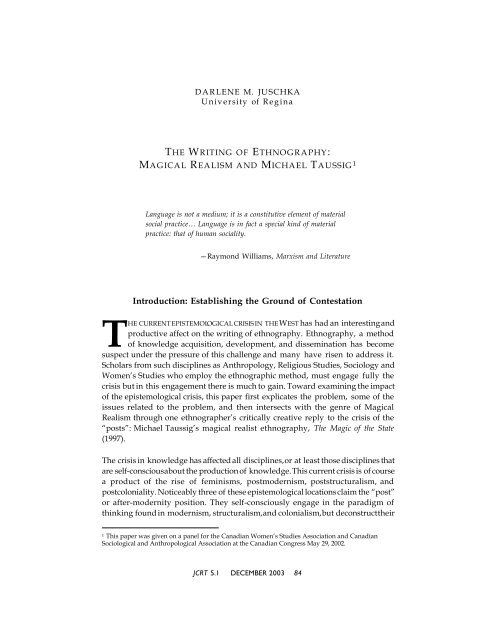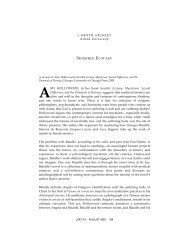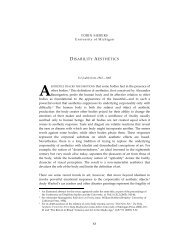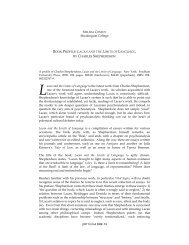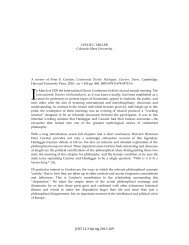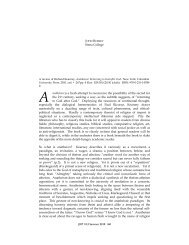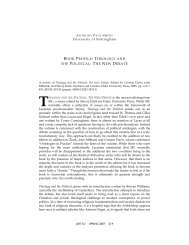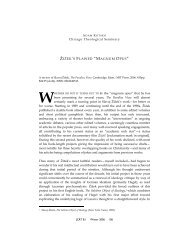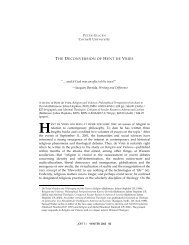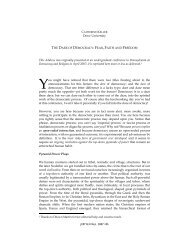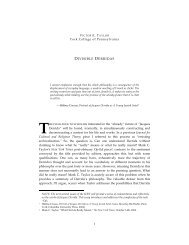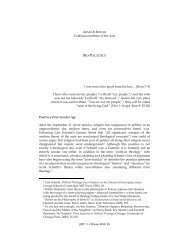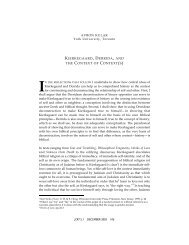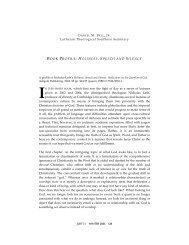the writing of ethnography: magical realism and michael taussig1
the writing of ethnography: magical realism and michael taussig1
the writing of ethnography: magical realism and michael taussig1
Create successful ePaper yourself
Turn your PDF publications into a flip-book with our unique Google optimized e-Paper software.
D ARLENE M. JUSCHKA<br />
Univ ersity <strong>of</strong> R eg ina<br />
THE WR ITING OF ETHNOG R APHY:<br />
MAG ICAL REALISM AND MICHAEL TAUSSIG 1<br />
Language is not a medium; it is a constitutive element <strong>of</strong> material<br />
social practice… Language is in fact a special kind <strong>of</strong> material<br />
practice: that <strong>of</strong> human sociality.<br />
—Raymond Williams, Marxism <strong>and</strong> Literature<br />
Introduction: Establishing <strong>the</strong> Ground <strong>of</strong> Contestation<br />
THE CURRENT EPISTEMOLOGICAL CRISIS IN THE WEST has had an interesting <strong>and</strong><br />
productive affect on <strong>the</strong> <strong>writing</strong> <strong>of</strong> <strong>ethnography</strong>. Ethnography, a method<br />
<strong>of</strong> knowledge acquisition, development, <strong>and</strong> dissemination has become<br />
suspect under <strong>the</strong> pressure <strong>of</strong> this challenge <strong>and</strong> many have risen to address it.<br />
Scholars from such disciplines as Anthropology, Religious Studies, Sociology <strong>and</strong><br />
Women’s Studies who employ <strong>the</strong> ethnographic method, must engage fully <strong>the</strong><br />
crisis but in this engagement <strong>the</strong>re is much to gain. Toward examining <strong>the</strong> impact<br />
<strong>of</strong> <strong>the</strong> epistemological crisis, this paper first explicates <strong>the</strong> problem, some <strong>of</strong> <strong>the</strong><br />
issues related to <strong>the</strong> problem, <strong>and</strong> <strong>the</strong>n intersects with <strong>the</strong> genre <strong>of</strong> Magical<br />
Realism through one ethnographer’s critically creative reply to <strong>the</strong> crisis <strong>of</strong> <strong>the</strong><br />
“posts”: Michael Taussig’s <strong>magical</strong> realist <strong>ethnography</strong>, The Magic <strong>of</strong> <strong>the</strong> State<br />
(1997).<br />
The crisis in knowledge has affected all disciplines, or at least those disciplines that<br />
are self-conscious about <strong>the</strong> production <strong>of</strong> knowledge. This current crisis is <strong>of</strong> course<br />
a product <strong>of</strong> <strong>the</strong> rise <strong>of</strong> feminisms, postmodernism, poststructuralism, <strong>and</strong><br />
postcoloniality. Noticeably three <strong>of</strong> <strong>the</strong>se epistemological locations claim <strong>the</strong> “post”<br />
or after-modernity position. They self-consciously engage in <strong>the</strong> paradigm <strong>of</strong><br />
thinking found in modernism, structuralism, <strong>and</strong> colonialism, but deconstruct <strong>the</strong>ir<br />
1 This paper was given on a panel for <strong>the</strong> Canadian Women’s Studies Association <strong>and</strong> Canadian<br />
Sociological <strong>and</strong> Anthropological Association at <strong>the</strong> Canadian Congress May 29, 2002.<br />
JCRT 5.1 DECEMBER 2003 84
JUSCHKA: Writing <strong>of</strong> Ethnography 85<br />
parent location <strong>and</strong> underscore its limitations. Feminism, as an umbrella term,<br />
does not claim <strong>the</strong> declarative “post,” but it could be called, with a fair amount <strong>of</strong><br />
justification, postpatriarchalism. The four epistemic movements I have named here<br />
have called into question <strong>the</strong> who or knower (e.g., situated knowledge), <strong>the</strong> how<br />
or knowing (e.g., language), <strong>and</strong> <strong>the</strong> what or known (e.g., reason) <strong>of</strong> knowing. 2<br />
Equally <strong>the</strong>y have raised <strong>the</strong> issue <strong>of</strong> <strong>the</strong> why <strong>of</strong> knowing, <strong>and</strong> how knowledge<br />
<strong>and</strong> power are intimately linked. Those institutions considered that <strong>the</strong> repositories<br />
<strong>of</strong> knowledge are <strong>of</strong>ten linked to hegemony. Knowledge <strong>and</strong> knowledge<br />
production, although contested in some quarters, continued to operate in some<br />
ways, i.e., in universal truths quite unproblematically until circa 1960. 3 Without<br />
developing a history <strong>of</strong> knowledge production in <strong>the</strong> West, <strong>and</strong> its various<br />
manifestations <strong>and</strong> contestations (<strong>the</strong> latter seen most emphatically in <strong>the</strong> science<br />
<strong>of</strong> hermeneutics) my claim that 1960 marks a turning point in <strong>the</strong> emergence <strong>of</strong><br />
specific contestatory discourses, which produce a crisis in knowledge, is reflected<br />
in <strong>the</strong> work <strong>of</strong> such <strong>the</strong>orists as, e.g., Thomas Kuhn, Richard Rorty, Simone de<br />
Beauvior, <strong>and</strong> Frantz Fanon.<br />
The “posts” engaged knowledge in such a way as to generate a crisis in <strong>the</strong><br />
production <strong>of</strong> knowledge as a social, historical, political, <strong>and</strong> cultural category.<br />
Certainly, within disciplines prior to 1960 <strong>the</strong>re was argumentation about <strong>the</strong><br />
interpretation <strong>of</strong> issues, development <strong>of</strong> taxonomies, <strong>and</strong> so forth, but <strong>the</strong><br />
production <strong>of</strong> knowledge as a self-interested, political, <strong>and</strong> hegemonic enterprise<br />
was not critically engaged in any broad fashion regardless <strong>of</strong> <strong>the</strong> fa<strong>the</strong>rs <strong>of</strong><br />
suspicion—Nietzsche, Marx, <strong>and</strong> Freud. When indeed such questions began to be<br />
raised, <strong>the</strong> question <strong>of</strong>ten was manifested as: “Well what are <strong>the</strong> facts <strong>and</strong> how can<br />
I, as an academic, get at <strong>the</strong>m?” It is at this juncture that <strong>the</strong> ethnographic turn as<br />
a way to grasp <strong>the</strong> “real” <strong>of</strong> existence came into play.<br />
In terms <strong>of</strong> Western epistemological concerns, <strong>the</strong> ethnographic turn (circa 1960) is<br />
indicative <strong>of</strong> a disciplinary method used in anthropology that was taken over by<br />
o<strong>the</strong>r disciplines, such as Religious Studies in an attempt to pan nuggets <strong>of</strong> <strong>the</strong> real<br />
<strong>and</strong> <strong>the</strong> true in terms <strong>of</strong> experience. Ethnography in <strong>the</strong> early 20 th century was<br />
manifested as knowledge acquisition <strong>and</strong> consisted <strong>of</strong> field work, wherein as<br />
Bronislov Malinowski (1884-1942) charged, one rubbed elbows with <strong>the</strong> o<strong>the</strong>r as<br />
a means to encounter truth—armchair anthropology was de-legitimized. But at <strong>the</strong><br />
same time this form <strong>of</strong> knowledge acquisition was being borrowed by o<strong>the</strong>r<br />
disciplines, <strong>ethnography</strong> also came under fire for <strong>the</strong> epistemological assumptions<br />
2 For a discussion <strong>of</strong> knowers, knowing <strong>and</strong> known in <strong>the</strong> feminist paradigm see Mary Hawkesworth,<br />
“Knowers, Knowing, Known: Feminist Theory <strong>and</strong> Claims <strong>of</strong> Truth.” Signs, vol. 14 no. 3, 1989: 533-<br />
557.<br />
3 In terms <strong>of</strong> <strong>the</strong> dissemination <strong>of</strong> something called “normative knowledge,” knowledge grounded in<br />
a positivistic scientific paradigm, I follow S<strong>and</strong>ra Harding in arguing that this kind <strong>of</strong> tunnel vision<br />
produced in <strong>and</strong> by <strong>the</strong> West has only been called into question in <strong>the</strong> last few decades. See S<strong>and</strong>ra<br />
Harding, Is Science Multicultural?: Postcolonialisms, Feminisms, <strong>and</strong> Epistemologies. (Bloomington <strong>and</strong><br />
Indianapolis: Indiana University Press, 1998), 21-38.<br />
JCRT 5.1 (December 2003)
JUSCHKA: Writing <strong>of</strong> Ethnography 86<br />
inherent to it. Ethnography assumed that inductive reasoning, <strong>the</strong> moving from<br />
<strong>the</strong> particular to <strong>the</strong> general to <strong>the</strong> universal in terms <strong>of</strong> <strong>the</strong> production <strong>of</strong><br />
knowledge, was unproblematic 4<br />
<strong>and</strong> did not in any significant way call into<br />
question <strong>the</strong> issue <strong>of</strong> <strong>the</strong> subject <strong>and</strong> object division: <strong>ethnography</strong> did not selfreflectively<br />
underst<strong>and</strong> that <strong>the</strong> discipline’s act <strong>of</strong> <strong>writing</strong> <strong>the</strong> o<strong>the</strong>r into existence<br />
was a colonizing act.<br />
It is to <strong>the</strong> issue <strong>of</strong> knowledge production in <strong>the</strong> ethnographic moment that this<br />
paper will address itself. More specifically, I will interrogate how <strong>ethnography</strong> acts<br />
as knowledge production, explore inherent challenges faced by those who use <strong>the</strong><br />
ethnographic method, <strong>and</strong> discuss how some have sought to address this<br />
epistemological conundrum <strong>and</strong> <strong>the</strong> implications arising from <strong>the</strong>ir forms <strong>of</strong><br />
address. It is not my intention to deconstruct <strong>and</strong> leave in pieces <strong>ethnography</strong> as<br />
an epistemological method, but ra<strong>the</strong>r to continue to probe <strong>the</strong> issue <strong>of</strong> knowledge<br />
production itself.<br />
Subjects <strong>and</strong> Objects: Attempts to Transcend Binarism<br />
The <strong>writing</strong> <strong>of</strong> <strong>ethnography</strong> made clearly visible <strong>the</strong> subject <strong>and</strong> object distinction.<br />
Under <strong>the</strong> influence <strong>of</strong> <strong>the</strong> previously mentioned “posts,” <strong>the</strong> potential to colonize<br />
<strong>the</strong> o<strong>the</strong>r in <strong>the</strong> <strong>writing</strong> <strong>of</strong> <strong>the</strong> ethnographic text became evident. Ethnographers<br />
<strong>of</strong> <strong>the</strong> early 20 th century did not address this problem; indeed, part <strong>of</strong> <strong>the</strong> problem<br />
that many sought to address was <strong>the</strong> issue <strong>of</strong> au<strong>the</strong>nticity. To write <strong>ethnography</strong><br />
was problematic when never having been among those peoples about whom one<br />
purported to be an expert. The issue <strong>of</strong> inductive reasoning used in scientific study<br />
was a form <strong>of</strong> reasoning seen as most appropriate for studying people <strong>and</strong> making<br />
that study relevant to <strong>the</strong> academic community. Drawing methodology from<br />
natural sciences, social sciences introduced <strong>the</strong> conceptualization <strong>of</strong> a rule-based<br />
study that would provide a necessary veracity to <strong>the</strong> study <strong>of</strong> peoples. These<br />
studies could not only contribute to <strong>the</strong> study <strong>of</strong> cultures <strong>and</strong> societies, but could<br />
also act as <strong>the</strong> definitive means by which to underst<strong>and</strong> <strong>and</strong> predict human<br />
behaviour. The logic <strong>of</strong> deductive reasoning, beginning with a generalization <strong>and</strong><br />
seeking to apply it to particulars was seen to be problematic. In this kind <strong>of</strong><br />
formulation, it was felt that <strong>the</strong> ethnographer would distort <strong>the</strong> data so that <strong>the</strong> data<br />
would conform to his or her <strong>the</strong>oretical premises. This did not mean that <strong>the</strong><br />
ethnographer did not have questions in mind; ra<strong>the</strong>r, she/he should not have<br />
answers in mind. Then, like <strong>the</strong> archival historian, <strong>the</strong> ethnographer would enter<br />
<strong>the</strong> field (archives) <strong>and</strong> learn about whatever phenomenon she/he had in mind<br />
to study. In this way, she/he documented <strong>the</strong> phenomenon in action, <strong>the</strong>reby<br />
providing an au<strong>the</strong>ntic study. But with <strong>the</strong> rise <strong>of</strong> feminist, postmodern,<br />
poststructural, or postcolonial challenges to <strong>the</strong> epistemological problems <strong>of</strong><br />
4 For a discussion <strong>of</strong> <strong>the</strong> rise <strong>of</strong> <strong>and</strong> problems with inductive reasoning see Mary Poovey, History <strong>of</strong> <strong>the</strong><br />
Modern Fact: Problems <strong>of</strong> Knowledge in <strong>the</strong> Sciences <strong>of</strong> Wealth <strong>and</strong> Society. (Chicago <strong>and</strong> London:<br />
JCRT 5.1 (December 2003)
JUSCHKA: Writing <strong>of</strong> Ethnography 87<br />
knower, known, <strong>and</strong> knowing, <strong>the</strong> ethnographic method was seen to be complicit<br />
in objectifying <strong>the</strong> focus <strong>of</strong> one’s study. As Michel de Certeau has argued:<br />
[f]our concepts appear to organize a scientific field whose status was<br />
established in <strong>the</strong> eighteenth century <strong>and</strong> which Ampère entitled<br />
‘ethnology’: orality (communication within a primitive, savage or<br />
traditional society), spatiality (<strong>the</strong> synchronic picture <strong>of</strong> a system that<br />
has no history), alterity (<strong>the</strong> difference which a cultural break puts<br />
forward), <strong>and</strong> unconsciousness (<strong>the</strong> status <strong>of</strong> collective phenomena,<br />
referring elsewhere). 5<br />
In terms <strong>of</strong> <strong>writing</strong>, <strong>the</strong> process was one <strong>of</strong> bringing <strong>the</strong> o<strong>the</strong>r (<strong>the</strong>m) into <strong>the</strong> frame<br />
<strong>of</strong> <strong>the</strong> same (us), although <strong>the</strong>y remained o<strong>the</strong>r (<strong>the</strong>m) <strong>and</strong> under control <strong>of</strong> <strong>the</strong><br />
same (us). Writing brought into consciousness what was deemed unconscious,<br />
inscribing <strong>and</strong> locating what was ephemeral <strong>and</strong> always in <strong>the</strong> present (lacking<br />
history) <strong>and</strong> ultimately allowed what was o<strong>the</strong>r to remain as such but clearly under<br />
<strong>the</strong> control <strong>of</strong> <strong>the</strong> same. In this <strong>writing</strong> <strong>of</strong> alterity it becomes apparent that <strong>the</strong><br />
colonizing <strong>of</strong> <strong>the</strong> o<strong>the</strong>r, be it <strong>the</strong> “south-worlds,” <strong>the</strong> “primitive,” or <strong>the</strong> female—all<br />
those marked in some fashion within a hegemonic discourse—is effected. In <strong>the</strong><br />
<strong>writing</strong> <strong>of</strong> <strong>ethnography</strong> <strong>the</strong> knower, known, <strong>and</strong> knowing are in <strong>the</strong> h<strong>and</strong>s <strong>of</strong> <strong>the</strong><br />
ethnographer. Although she/he may engage an informant, <strong>the</strong> knowledge is<br />
always transcribed by <strong>the</strong> ethnographer who has <strong>the</strong> knowledge to know <strong>the</strong><br />
o<strong>the</strong>r in a way <strong>the</strong>y could never know <strong>the</strong>mselves. Clearly <strong>the</strong> subject location<br />
belongs to <strong>the</strong> master narrator—<strong>the</strong> ethnographer—<strong>and</strong> clearly <strong>the</strong> object location<br />
belongs to that <strong>of</strong> <strong>the</strong> observed, <strong>the</strong> ethnographer’s datum. In terms <strong>of</strong><br />
appropriation <strong>of</strong> voice (feminism), <strong>of</strong> re-colonization (postcolonialism), <strong>of</strong> <strong>the</strong><br />
mediation through language (poststructuralism) <strong>and</strong> Archimedean point or <strong>the</strong><br />
unsituated <strong>the</strong>orist (postmodernism), <strong>the</strong> <strong>writing</strong> <strong>of</strong> <strong>ethnography</strong>, like western<br />
epistemology, faced a crisis.<br />
Several attempts have been made in <strong>the</strong> fields <strong>of</strong> Religious Studies <strong>and</strong><br />
Anthropology to address this problem. 6 Some thought that if <strong>the</strong> product <strong>of</strong> <strong>the</strong>ir<br />
study was co-authored with <strong>the</strong>ir informant, that in turn, this could address <strong>the</strong><br />
problem <strong>of</strong> appropriation <strong>and</strong> colonization; however, <strong>the</strong> unsituated <strong>the</strong>orist<br />
remained a problem. O<strong>the</strong>rs thought to address <strong>the</strong> issue <strong>of</strong> speaking from<br />
nowhere (Archimedean point) by situating <strong>the</strong>mselves in terms <strong>of</strong> <strong>the</strong> locality <strong>of</strong><br />
<strong>the</strong> study (in <strong>the</strong> field) or in terms <strong>of</strong> a locality <strong>of</strong> <strong>the</strong> ethnographer (in <strong>the</strong><br />
university), or both. A certain reflexivity was introduced into <strong>the</strong> <strong>writing</strong> <strong>of</strong> <strong>the</strong><br />
<strong>ethnography</strong>. No longer was <strong>the</strong> ethnographer absent. Ra<strong>the</strong>r her/his thoughts,<br />
interactions, insights, problems, <strong>and</strong> day-to-day experiences were introduced in <strong>the</strong><br />
University <strong>of</strong> Chicago Press, 1998).<br />
5 Michel de Certeau, The Writing <strong>of</strong> History. Tom Conley, trans. (New York: Columbia University<br />
Press, 1988 [1975]), 209.<br />
6 See also <strong>the</strong> introduction <strong>of</strong> Fiona Bowie The Anthropology <strong>of</strong> Religion. (Oxford: Blackwell, 2000).<br />
JCRT 5.1 (December 2003)
JUSCHKA: Writing <strong>of</strong> Ethnography 88<br />
<strong>writing</strong> <strong>of</strong> <strong>the</strong> ethnographic record. 7 Added to this, <strong>and</strong> delineated in terms <strong>of</strong> an<br />
ethics <strong>of</strong> caring, it was felt by some <strong>the</strong>re should be some form <strong>of</strong> return to <strong>the</strong><br />
community one studied, be it in <strong>the</strong> form <strong>of</strong> economic support attained through a<br />
governmental institution, supporting NGOs in an attempt to assist <strong>the</strong> community,<br />
instruction <strong>of</strong> some sort to <strong>the</strong> community, or possibly technological assistance, e.g.,<br />
<strong>the</strong> building <strong>of</strong> a well. As ethical rejoinders, some <strong>of</strong> <strong>the</strong>se (liberal) responses<br />
worked. But in all <strong>the</strong>se attempts, <strong>the</strong> difficulty <strong>of</strong> dealing with <strong>the</strong> object-subject<br />
binary in terms <strong>of</strong> representation has not been successful. The problems <strong>of</strong><br />
appropriation, mediation through language, <strong>the</strong> Archimedean point, <strong>and</strong> recolonialization<br />
are integral to Western history <strong>and</strong> cannot be ignored; instead, <strong>the</strong>y<br />
must be fully engaged. The process should not be an attempt to transcend<br />
binarism, but to walk into <strong>the</strong> middle <strong>of</strong> <strong>the</strong> conundrum.<br />
Writing <strong>and</strong> <strong>the</strong> Colonization <strong>of</strong> <strong>the</strong> O<strong>the</strong>r: Ipseity/Alterity<br />
Edward Said, Trinh T. Minh-Ha, 8 <strong>and</strong> Michel de Certeau, among o<strong>the</strong>rs, have<br />
effectively laid bare <strong>the</strong> process <strong>of</strong> “o<strong>the</strong>rfication” in terms <strong>of</strong> knowledge<br />
production. In his various <strong>writing</strong>s, Certeau has demonstrated an abiding interest<br />
in <strong>the</strong> concept <strong>of</strong> alterity. Alterity, according to <strong>the</strong> OED is defined as “[t]he state<br />
<strong>of</strong> being o<strong>the</strong>r or different; diversity, ‘o<strong>the</strong>rness.’” As an ideological concept acting<br />
as an epistemological unit, alterity is in an oppositional binary relationship with<br />
ipseity (self) <strong>and</strong> in an analogical relationship with <strong>the</strong>m (vs. us), margin (vs.<br />
center), primitive (vs. civilized), nature (vs. culture), <strong>and</strong> orality (vs. written), to<br />
name but a few. Ipseity, according to <strong>the</strong> OED, is defined as “personal identity <strong>and</strong><br />
individuality; selfhood.” To some <strong>the</strong>orists alterity appears to be positively<br />
charged. This is due, I think, to it being paradoxical in that it is both empty, empty<br />
in terms <strong>of</strong> absence (it lacks self), <strong>and</strong> full, full <strong>of</strong> o<strong>the</strong>rness (all that which <strong>the</strong><br />
category <strong>of</strong> <strong>the</strong> same cannot contain). 9 None<strong>the</strong>less, it does not exist o<strong>the</strong>r than in<br />
a binary relationship with ipseity as self/o<strong>the</strong>r or ipseity/alterity. Without self, <strong>the</strong><br />
o<strong>the</strong>r (alterity) does not exist <strong>and</strong>, equally, without <strong>the</strong> o<strong>the</strong>r, self (ipseity) does not<br />
exist. 10 Alterity is a concept that currently operates in relation to <strong>the</strong> logic <strong>of</strong><br />
7 For a variety <strong>of</strong> ways to write <strong>ethnography</strong> <strong>and</strong> discussions about auto<strong>ethnography</strong> <strong>and</strong> o<strong>the</strong>r forms<br />
<strong>of</strong> authorial reflexivity see Irma McClaurin, ed., Black Feminist Anthropology: Theory, Politics, Praxis <strong>and</strong><br />
Poetics. (New Brunswick, New Jersey: Rutgers 2001) or Carolyn Ellis <strong>and</strong> Arthur Bochner, eds.,<br />
Composing Ethnography: Alternative Forms <strong>of</strong> Qualitative Writing. (Walnut Creek, London, New Dehli:<br />
Altamira Press, 1996).<br />
8 Trinh T. Minh-ha, Woman, Native, O<strong>the</strong>r: Writing Postcoloniality <strong>and</strong> Feminism. (Bloomington: Indiana<br />
University Press, 1989).<br />
9 This is a value that some thinkers have invested <strong>the</strong>ir <strong>the</strong>ories with, for example Luce Irigaray.<br />
“The stranger, like o<strong>the</strong>r tropes, is a politically informed account <strong>of</strong> alternative subjectivity” Elizabeth<br />
Grosz, Sexual Subversions: Three French Feminists. (Sydney: Allen <strong>and</strong> Unwin, 1989), xiv.<br />
10 “The ‘O<strong>the</strong>r’ in <strong>the</strong> work <strong>of</strong> Michel Foucault, for instance, consists <strong>of</strong> those who are excluded from<br />
positions <strong>of</strong> power, <strong>and</strong> are <strong>of</strong>ten victimized within a predominantly liberal humanist view <strong>of</strong> <strong>the</strong><br />
subject.” (Stewart Sim, ed. The Routledge Critical Dictionary <strong>of</strong> Postmodern Thought. [New York:<br />
Routledge, 1999], 181.) And “[A]ll cultures thus create a division <strong>of</strong> humanity between <strong>the</strong>mselves<br />
on <strong>the</strong> one h<strong>and</strong>, a representation par excellence <strong>of</strong> <strong>the</strong> human, <strong>and</strong> <strong>the</strong> o<strong>the</strong>rs, which only<br />
participate in humanity to a lesser degree. The discourse that primitive societies use for <strong>the</strong>mselves, a<br />
discourse condensed in <strong>the</strong> names <strong>the</strong>y confer upon <strong>the</strong>mselves [Ava, men; Ache, persons;<br />
JCRT 5.1 (December 2003)
JUSCHKA: Writing <strong>of</strong> Ethnography 89<br />
colonialization, be it <strong>of</strong> <strong>the</strong> female, animals, <strong>the</strong> earth, or <strong>the</strong> feminized male.<br />
In terms <strong>of</strong> hegemony, alterity is <strong>the</strong> o<strong>the</strong>r against which <strong>the</strong> dominant group<br />
recognizes itself as dominant. Therefore, <strong>the</strong> category <strong>of</strong> alterity is a double-edged<br />
sword, one that can cut both ways: <strong>the</strong> same is dependent upon <strong>the</strong> o<strong>the</strong>r to exist<br />
as <strong>the</strong> same. Those who have resisted colonization, many <strong>of</strong> <strong>the</strong> marginalized <strong>and</strong><br />
some who occupy <strong>the</strong> position <strong>of</strong> <strong>the</strong> center, have recognized this <strong>and</strong> have taken<br />
up <strong>the</strong> category <strong>of</strong> alterity in order to subvert <strong>the</strong> category <strong>of</strong> ipseity, <strong>and</strong> in <strong>the</strong><br />
process underscore <strong>the</strong> inherent power in <strong>the</strong> category <strong>of</strong> <strong>the</strong> o<strong>the</strong>r. However,<br />
hegemonic powers typically contain many means by which to maintain <strong>the</strong>ir<br />
position <strong>of</strong> power. The absorption <strong>of</strong> alterity in order to nuance ipseity has been<br />
one <strong>of</strong> <strong>the</strong>se means. For example, an appropriative movement that has occurred<br />
in <strong>the</strong> last several decades has been multiculturalism (<strong>the</strong> reverse <strong>of</strong> melting pot<br />
ideology). Although seen as a positive move, wherein difference throughout <strong>the</strong><br />
demographic body <strong>of</strong> <strong>the</strong> state is embraced, this act is simply a symbolic gesture<br />
<strong>of</strong> inclusion at its best. In terms <strong>of</strong> order <strong>and</strong> structure <strong>of</strong> <strong>the</strong> state, <strong>the</strong> same (or<br />
hegemony/homogeneity) operates as an umbrella overseeing, neutralizing <strong>and</strong><br />
<strong>the</strong>refore controlling <strong>the</strong> differences in <strong>the</strong> entirety <strong>of</strong> <strong>the</strong> state. Difference is<br />
allowed only ins<strong>of</strong>ar as it works toward empowering hegemony. In this manner,<br />
multiculturalism is seen to enrich <strong>the</strong> state in its body (culture seen in food, colour,<br />
or literature), but is never present in terms <strong>of</strong> its head (operative governmental<br />
power, economic power, or epistemological power)—alterity, in this instance, is in<br />
service <strong>of</strong> <strong>the</strong> state.<br />
Underst<strong>and</strong>ing <strong>the</strong> difficulty <strong>of</strong> engaging a binary construction, such as<br />
alterity/ipseity, is <strong>the</strong> first step toward engaging <strong>the</strong> category <strong>of</strong> alterity critically.<br />
Clearly flipping <strong>the</strong> binary <strong>and</strong> altering its pole <strong>of</strong> valuation–negative is positive<br />
<strong>and</strong> positive is negative–does not challenge <strong>the</strong> logic itself <strong>and</strong> addresses only <strong>the</strong><br />
ordering <strong>of</strong> its contents. As Bruce Lincoln notes, inversion is a useful strategy for<br />
revealing <strong>the</strong> logic <strong>of</strong> a system, but it is <strong>of</strong>ten questionable as a serious challenge<br />
to <strong>the</strong> system. He argues “[t]o be sure it is a powerful act to turn <strong>the</strong> world upside<br />
down, but a simple 180-degree rotation is not difficult to undo. An order twice<br />
inverted is an order restored, perhaps even streng<strong>the</strong>ned as a result <strong>of</strong> <strong>the</strong><br />
exercise.” 11<br />
Writing <strong>and</strong> <strong>the</strong> Accounting <strong>of</strong> Ipseity/Alterity<br />
In terms <strong>of</strong> <strong>writing</strong> ipseity <strong>and</strong> alterity, an even greater problem arises.<br />
Yanomami, people; Inuit, men], is thus ethnocentric through <strong>and</strong> through … It is part <strong>of</strong> a culture’s<br />
essence to be ethnocentric, precisely to <strong>the</strong> degree to which every culture considers itself <strong>the</strong> culture<br />
par excellence. In o<strong>the</strong>r words, cultural alterity is never thought <strong>of</strong> as positive difference, but always<br />
as inferiority on a hierarchical axis.” (Pierre Clastres, Archeology <strong>of</strong> Violence in Semiotext(e). Jeanine<br />
Herman, trans. [MIT Press, 1994], 46.)<br />
11 Bruce Lincoln, Discourse <strong>and</strong> <strong>the</strong> Construction <strong>of</strong> Society: Comparative Studies <strong>of</strong> Myth, Ritual <strong>and</strong><br />
Classification. (New York <strong>and</strong> London: Oxford University Press, 1989), 159.<br />
JCRT 5.1 (December 2003)
JUSCHKA: Writing <strong>of</strong> Ethnography 90<br />
Colonialization <strong>of</strong> <strong>the</strong> o<strong>the</strong>r in geopolitical terms was a long process <strong>of</strong> conquest,<br />
genocide, settlement, commodification, <strong>and</strong> exploitation. Focused on <strong>the</strong> “new<br />
world,” this was a process that began with “discovery” in <strong>the</strong> late 15 th century.<br />
Throughout this long process <strong>writing</strong> <strong>the</strong> o<strong>the</strong>r <strong>and</strong> <strong>the</strong> o<strong>the</strong>r <strong>of</strong> <strong>the</strong> o<strong>the</strong>r (<strong>the</strong><br />
female o<strong>the</strong>r) was a significant <strong>and</strong> central aspect <strong>of</strong> establishing <strong>the</strong> alterity <strong>of</strong> non-<br />
Europeans. Travelogues that began with <strong>the</strong> protagonist—<strong>the</strong> European—moving<br />
from <strong>the</strong> center, Europe, to <strong>the</strong> margins <strong>of</strong> <strong>the</strong> new worlds established <strong>the</strong><br />
parameters <strong>of</strong> <strong>the</strong> discourse. 12 The “native” was “o<strong>the</strong>r” in terms <strong>of</strong> being exotic,<br />
savage, cannibalistic, sexual, <strong>and</strong> pre-Christian as opposed to, <strong>and</strong> in relation with,<br />
<strong>the</strong> European “same” who became, in terms <strong>of</strong> this binary: familiar, civilized,<br />
culinary, chaste, <strong>and</strong> Christian. 13 The encounter with <strong>the</strong> o<strong>the</strong>r was an experience<br />
<strong>of</strong> <strong>the</strong> primal, <strong>the</strong> au<strong>the</strong>ntic, <strong>and</strong> <strong>the</strong> real that became <strong>the</strong> narrativization <strong>of</strong> <strong>the</strong><br />
o<strong>the</strong>r. Ultimately, <strong>the</strong>se travelogues became one source <strong>of</strong> knowledge for <strong>the</strong> o<strong>the</strong>r.<br />
The <strong>writing</strong> <strong>of</strong> <strong>the</strong> o<strong>the</strong>r was a process <strong>of</strong> naming <strong>and</strong> <strong>the</strong>refore defining <strong>and</strong><br />
claiming <strong>the</strong> o<strong>the</strong>r in terms <strong>of</strong> Western epistemology. Writing is an act <strong>of</strong><br />
knowledge production, <strong>and</strong> <strong>the</strong> o<strong>the</strong>r became <strong>the</strong> object in terms <strong>of</strong> Western<br />
knowledge production. As a resulting, <strong>writing</strong> is suspect in terms <strong>of</strong> its colonizing<br />
potential.<br />
Writing <strong>and</strong> Knowing <strong>the</strong> Constructed World<br />
If <strong>writing</strong> is a potential act <strong>of</strong> colonialization, how can it be reclaimed as a challenge<br />
to colonialization? Hayden White, a <strong>the</strong>orist <strong>of</strong> <strong>writing</strong>, describes in The Content <strong>of</strong><br />
<strong>the</strong> Form (1987), different genres in <strong>the</strong> <strong>writing</strong> <strong>of</strong> history: annals, chronicles, <strong>and</strong><br />
history proper. In <strong>the</strong> first two forms <strong>the</strong>re is a lack <strong>of</strong> analysis <strong>and</strong> narrativization,<br />
a lack that calls into question whe<strong>the</strong>r <strong>the</strong>y are proper histories. White notes Peter<br />
Gay’s comment that “historical narration without analysis is trivial, historical<br />
analysis without narration is incomplete.” 14 Equally, <strong>ethnography</strong> requires <strong>the</strong><br />
same kind <strong>of</strong> engagement to be <strong>ethnography</strong>; narrativization must be employed.<br />
However, as noted above it is precisely this narrativization laying claim to <strong>the</strong><br />
o<strong>the</strong>r. How <strong>the</strong>n should one engage narrativization in such a way as to resist<br />
colonialization? White, in his examination <strong>of</strong> history, notes that in this act <strong>of</strong><br />
narrativization current genre forms are engaged in order to relate <strong>the</strong> history.<br />
These genre forms provide a structure for <strong>the</strong> telling <strong>of</strong> <strong>the</strong> events. White’s <strong>the</strong>ory<br />
<strong>of</strong> historiography argues that history has an explanatory structure. It seeks to<br />
provide a meaning, a “kind” <strong>of</strong> story, i.e., Romance, Comedy, Tragedy, or Satire,<br />
or to form an argument—<strong>the</strong> point <strong>of</strong> it all, what it adds up to, or <strong>the</strong> ideological<br />
implications—a set <strong>of</strong> prescriptions for taking a position in <strong>the</strong> present world <strong>of</strong><br />
social praxis <strong>and</strong> acting upon it (ei<strong>the</strong>r to change <strong>the</strong> world or to maintain it in its<br />
12 For an extended discussion on <strong>the</strong> subject <strong>of</strong> European travelogues see Certeau, The Writing <strong>of</strong><br />
History, 209-243.<br />
13 For a complete discussion <strong>of</strong> this binarism see Certeau, The Writing <strong>of</strong> History, 209-243.<br />
14 Hayden White, The Content <strong>of</strong> <strong>the</strong> Form: Narrative, Discourse <strong>and</strong> Historical Representation. (Baltimore<br />
<strong>and</strong> London: The John Hopkins University Press, 1987), 5.<br />
JCRT 5.1 (December 2003)
JUSCHKA: Writing <strong>of</strong> Ethnography 91<br />
current state). 15 These forms <strong>of</strong> explanation are extrapolated within narrative<br />
structures that create <strong>the</strong> form <strong>and</strong> define <strong>the</strong> meaning <strong>of</strong> history, <strong>and</strong> that are<br />
dependant upon generic story types that are meaningful to <strong>the</strong> historical period <strong>of</strong><br />
<strong>the</strong> interpreter. 16 The <strong>writing</strong> <strong>of</strong> history, whe<strong>the</strong>r as some fortuitous end or a fall<br />
from grace, is a formulaic narrative engaged in order to shape <strong>the</strong> momentary<br />
events into a specific telling, a telling that makes sense to <strong>the</strong> interpreter/historian.<br />
From <strong>the</strong> historian’s social embeddedness, a r<strong>and</strong>om event or events will be<br />
invested with historical signification. Accordingly, Rol<strong>and</strong> Bar<strong>the</strong>s, arguing from<br />
a structuralist/poststructuralist position, asks:<br />
Does <strong>the</strong> narration <strong>of</strong> past events, which, in our culture from <strong>the</strong> time <strong>of</strong> <strong>the</strong> Greeks<br />
onwards, has generally been subject to <strong>the</strong> sanction <strong>of</strong> historical ‘science,’ bound<br />
to <strong>the</strong> underlying st<strong>and</strong>ard <strong>of</strong> <strong>the</strong> “real,” <strong>and</strong> justified by <strong>the</strong> principles <strong>of</strong><br />
“rational” exposition—does this form <strong>of</strong> narration really differ, in some specific<br />
trait, in some indubitably distinctive feature, from imaginary narration, as we find<br />
it in <strong>the</strong> epic, <strong>the</strong> novel, <strong>and</strong> <strong>the</strong> drama? 17<br />
Equally, this same act <strong>of</strong> narrativization is engaged in <strong>ethnography</strong>; r<strong>and</strong>om<br />
events are folded into a telling—a story—about a group, a clan, a moiety, a society<br />
or a culture. It is in <strong>the</strong> shaping (telling) <strong>of</strong> events into a discernable narrative<br />
(romance, epic, comedy, tragedy or chronicle) that one can tell “a wink from a<br />
blink.” In o<strong>the</strong>r words, <strong>the</strong> meaning <strong>of</strong> it all (<strong>the</strong> study) reveals itself through <strong>the</strong><br />
narrative form.<br />
Underst<strong>and</strong>ing that <strong>ethnography</strong> is subject to narrativization is <strong>the</strong> second move<br />
toward critically engaging it. Primarily this is because underst<strong>and</strong>ing that<br />
narration is an act <strong>of</strong> social creation means that <strong>the</strong> writer cannot help but be<br />
cognizant <strong>of</strong> her/his position in <strong>the</strong> narrative, <strong>the</strong> position <strong>of</strong> master narrator. In<br />
<strong>the</strong> past, <strong>the</strong> author as master narrator, was absent from <strong>the</strong> <strong>ethnography</strong>, 18 but by<br />
underst<strong>and</strong>ing <strong>the</strong> colonial implications <strong>of</strong> <strong>the</strong> role <strong>of</strong> <strong>the</strong> master narrator, it became<br />
increasingly necessary for those who use <strong>ethnography</strong> to account for <strong>the</strong>mselves<br />
in <strong>the</strong>ir ethnographic productions: hence, <strong>the</strong> strategy <strong>of</strong> auto<strong>ethnography</strong>.<br />
However, as a strategy, auto<strong>ethnography</strong> has its pitfalls, <strong>the</strong> most salient being <strong>the</strong><br />
implicit claim to au<strong>the</strong>ntic voice. The ethnographer as writer <strong>of</strong> <strong>the</strong> text continues,<br />
regardless <strong>of</strong> her/his emplacement in <strong>the</strong> text, to hold <strong>the</strong> position <strong>of</strong> narrator <strong>and</strong><br />
although omniscience by her/his presence is made impossible, <strong>the</strong> position <strong>of</strong> <strong>the</strong><br />
au<strong>the</strong>ntic knower is not. As <strong>the</strong> au<strong>the</strong>ntic knower she/he translates <strong>and</strong> interprets<br />
for <strong>the</strong> reader. Although not omniscient, she/he remains an au<strong>the</strong>ntic knower in<br />
relation to her/his subjects <strong>of</strong> analysis <strong>and</strong> <strong>the</strong> readers <strong>of</strong> <strong>the</strong> text. Equally<br />
15 Hayden White, Metahistory: The Historical Imagination in Nineteenth-Century Europe. (Baltimore <strong>and</strong><br />
London: <strong>the</strong> John Hopkins University Press, 1973), 7.<br />
16 See White, Metahistory, 6-31 for an extended discussion.<br />
17 Bar<strong>the</strong>s in White, The Content <strong>of</strong> <strong>the</strong> Form, 35.<br />
18 There have, however, been exceptions, e.g., Zora Neale Hurston.<br />
JCRT 5.1 (December 2003)
JUSCHKA: Writing <strong>of</strong> Ethnography 92<br />
problematic is <strong>the</strong> writer’s maintenance <strong>of</strong> <strong>the</strong> position <strong>of</strong> <strong>the</strong> same in counterdistinction<br />
to those o<strong>the</strong>rs she studies. It may be that when <strong>the</strong> ethnographer enters<br />
<strong>the</strong> culture <strong>of</strong> <strong>the</strong> group that is <strong>the</strong> subject <strong>of</strong> her study she may be in <strong>the</strong> position<br />
<strong>of</strong> <strong>the</strong> stranger (<strong>and</strong> <strong>the</strong>refore o<strong>the</strong>r to <strong>the</strong> o<strong>the</strong>r) but when <strong>the</strong> process <strong>of</strong><br />
narrativizing (<strong>writing</strong>) is engaged, she, as <strong>the</strong> <strong>writing</strong>/speaking human subject in<br />
<strong>the</strong> text, is fixed at <strong>the</strong> center. Fur<strong>the</strong>rmore, in terms <strong>of</strong> presentation, language <strong>and</strong><br />
readership, <strong>and</strong> <strong>the</strong> academic world she operates within (those who are <strong>the</strong><br />
primary consumers <strong>of</strong> <strong>ethnography</strong>), she is equally fixed at <strong>the</strong> center. Finally,<br />
even <strong>the</strong> genres that will be used to tell <strong>the</strong> story will locate <strong>the</strong> ethnographer <strong>and</strong><br />
her world at <strong>the</strong> center; ultimately, <strong>the</strong> place <strong>and</strong> people she encounters <strong>and</strong><br />
studies remain fixed on <strong>the</strong> margins. How, <strong>the</strong>n, can one move through <strong>the</strong> process<br />
<strong>of</strong> <strong>writing</strong> <strong>ethnography</strong> without colonizing/narrativizing those about whom one<br />
writes?<br />
Narratology <strong>and</strong> Ethnography: Transgressing <strong>the</strong> Binary:<br />
The Category <strong>of</strong> Magical-Realism<br />
Magical Realism is possibly a genre 19 <strong>of</strong> <strong>writing</strong> that blurs <strong>the</strong> line between <strong>the</strong><br />
“real” <strong>and</strong> <strong>the</strong> fantastic <strong>and</strong> so may <strong>of</strong>fer a solution to <strong>the</strong> conundrum <strong>of</strong> narrative<br />
o<strong>the</strong>rfication, as I will argue shortly. Franz Roh, a German Art critic who felt it to<br />
be an art category, introduced <strong>the</strong> term in 1929. Theoretically developed by Alejo<br />
Carpentier as lo real-marvilloso 20 <strong>and</strong> used by a number <strong>of</strong> “south world” writers<br />
such as Ben Okri, Gabriel Garcia Marquez <strong>and</strong> Anna Castillo, as well as Sou<strong>the</strong>rn<br />
Black American writers such as Toni Morrison, it is a form <strong>of</strong> <strong>writing</strong> that employs<br />
paradoxes in relation to time, reality, <strong>and</strong> space. The past, present, <strong>and</strong> future run<br />
alongside each o<strong>the</strong>r, interwoven <strong>and</strong> at times undifferentiated; space is a montage<br />
in which <strong>the</strong> center <strong>and</strong> periphery are overlaid or overlapping; reality <strong>and</strong> truth<br />
are separated <strong>and</strong> <strong>the</strong>ir inherent relationship called into question by <strong>the</strong> revelation<br />
<strong>of</strong> fantasy <strong>and</strong> desire residing between <strong>the</strong> two. In <strong>magical</strong> <strong>realism</strong>, irony <strong>and</strong><br />
tragedy operate as <strong>the</strong> face behind <strong>the</strong> mask <strong>of</strong> <strong>the</strong> comedy that underscores tragic<br />
futility. In this equation, <strong>the</strong> real is <strong>the</strong> colonialist overlay that imperils life <strong>and</strong><br />
culture, while <strong>the</strong> fantastic is that which operates in direct anti<strong>the</strong>sis to <strong>the</strong><br />
European super-civilization in an attempt to negotiate <strong>the</strong> persistence <strong>of</strong> colonial<br />
memory, 21 in <strong>the</strong> hope <strong>of</strong> creating a future that nei<strong>the</strong>r represses <strong>the</strong> past nor is<br />
permanently mutilated by it. Ra<strong>the</strong>r, freedom is potentialized by simultaneously<br />
19 There is some discussion as to whe<strong>the</strong>r <strong>magical</strong> <strong>realism</strong> is an actual genre <strong>of</strong> <strong>writing</strong> differentiated<br />
from fantasy. Because <strong>of</strong> its use <strong>of</strong> historical events <strong>and</strong> its obvious political critique I believe it to be a<br />
genre unto itself <strong>and</strong> not fantasy. But because I am not a literary critic <strong>and</strong> do not operate in <strong>the</strong> field<br />
<strong>of</strong> English or Literature, I would be disinclined to attempt a definitive statement in regard to its<br />
genre status.<br />
20 Edwin Williams, “Magical Realism <strong>and</strong> <strong>the</strong> Theme <strong>of</strong> Incest in One Hundred Years <strong>of</strong> Solitude.” In<br />
Bernard McGuirk <strong>and</strong> Richard Cardwell eds., Gabriel García Màrquez: New Readings. (Cambridge:<br />
Cambridge University Press, 1988), 45–64.<br />
21 For an interesting discussion <strong>of</strong> <strong>the</strong> disabling persistence <strong>of</strong> colonial memory see Jeremy Adelman ,<br />
ed., Colonial Legacies: The Problem <strong>of</strong> Persistence in Latin American History. (New York <strong>and</strong> London:<br />
Routledge, 1999).<br />
JCRT 5.1 (December 2003)
JUSCHKA: Writing <strong>of</strong> Ethnography 93<br />
holding in one h<strong>and</strong> dystopia (ill-place) <strong>and</strong> utopia (non-place) to establish a<br />
hybrid, dis-place (o<strong>the</strong>r place) or “heterotopia.” In <strong>magical</strong> <strong>realism</strong> <strong>the</strong> everyday<br />
is <strong>the</strong> marvilloso found in <strong>the</strong> intricacies <strong>and</strong> drama <strong>of</strong> living a desperate life. It is<br />
<strong>the</strong> desperate living that formulates a desperate history making visible <strong>the</strong><br />
potential for society not to be this way. Several key concepts that emerge <strong>and</strong><br />
establish <strong>the</strong> telling as <strong>magical</strong> <strong>realism</strong> are related to, as indicated: space in terms<br />
<strong>of</strong> inner <strong>and</strong> outer; center <strong>and</strong> periphery <strong>and</strong> <strong>the</strong> text; time in terms <strong>of</strong> linearity;<br />
<strong>and</strong> reality in terms <strong>of</strong> its construction.<br />
Toni Morrison’s novel, Beloved (1987), exemplifies quite wonderfully <strong>the</strong> challenge<br />
to <strong>the</strong> binary opposition <strong>of</strong> inner <strong>and</strong> outer space. In this novel, one encounters <strong>the</strong><br />
character Se<strong>the</strong> who is locked in her house <strong>and</strong> tormented by <strong>the</strong> ghost <strong>of</strong> her<br />
child, Beloved, whom she murdered in a desperate act to keep her from reenslavement.<br />
This ghost-child dominates <strong>the</strong> inner-world <strong>of</strong> <strong>the</strong> house, but <strong>the</strong><br />
ghost-child has come into existence because <strong>of</strong> <strong>the</strong> outer-world <strong>of</strong> American slavery.<br />
Se<strong>the</strong>, in a long <strong>and</strong> arduous journey has escaped to freedom, but those who would<br />
own her <strong>and</strong> her children have arrived to return her <strong>and</strong> <strong>the</strong> children to <strong>the</strong><br />
condition <strong>of</strong> slavery. Se<strong>the</strong> attempts to kill all <strong>the</strong> children for she believes death<br />
is a preferred state to enslavement:<br />
When <strong>the</strong> four horsemen came [allusions to <strong>the</strong> Apocalypse <strong>of</strong><br />
course]—schoolteacher, one nephew, one slave catcher <strong>and</strong> a<br />
sheriff—<strong>the</strong> house on Bluestone Road was so quiet <strong>the</strong>y thought <strong>the</strong>y<br />
were too late…Right <strong>of</strong>f it was clear, to <strong>the</strong> schoolteacher especially,<br />
that <strong>the</strong>re was nothing <strong>the</strong>re to claim. The three (now four—because<br />
she’d had <strong>the</strong> one coming when she cut) pickaninnies <strong>the</strong>y had hoped<br />
were alive <strong>and</strong> well enough to take back to Kentucky, take back <strong>and</strong><br />
raise properly to do <strong>the</strong> work Sweet Home desperately needed, were<br />
not. 22<br />
The outer-world, or <strong>the</strong> real world, is one <strong>of</strong> injustice <strong>and</strong> horror for Blacks during<br />
<strong>the</strong> period <strong>of</strong> slavery in <strong>the</strong> United States. This injustice <strong>and</strong> horror slipped into<br />
Se<strong>the</strong>’s inner-world, into her home <strong>and</strong> mind that were both at one time a<br />
sanctuary—an injustice; horror manifested by <strong>the</strong> petulant <strong>and</strong> highly destructive<br />
ghost-child. Se<strong>the</strong> is held hostage in her home, overwhelmed by her guilt for <strong>the</strong><br />
murder <strong>and</strong> attempted murder <strong>of</strong> her children. However, <strong>the</strong> outer-world will step<br />
in again, but this time in a restorative manner, as it is only through <strong>the</strong> actions <strong>of</strong><br />
<strong>the</strong> women <strong>of</strong> <strong>the</strong> Black community, who exorcise <strong>the</strong> ghost-child, that <strong>the</strong> home<br />
<strong>and</strong> mind <strong>of</strong> Se<strong>the</strong> are freed from <strong>the</strong> horror, injustice, <strong>and</strong> guilt produced by<br />
slavery <strong>and</strong> signified by a hurtful ghost-child. The space or boundary between<br />
outer <strong>and</strong> inner is merged in <strong>the</strong> novel so that <strong>the</strong> inner-world is understood as<br />
conditional to <strong>the</strong> outer-world. This leads to an awareness that <strong>the</strong> two cannot be<br />
separated. The binary opposition between <strong>the</strong> inner <strong>and</strong> outer is a boundary<br />
22 Toni Morrison, Beloved. (New York: Knopf, 1987), 148-149.<br />
JCRT 5.1 (December 2003)
JUSCHKA: Writing <strong>of</strong> Ethnography 94<br />
referring to all boundaries that are, in Magical Realism, “fold[ed] <strong>and</strong> refold[ed]<br />
like quicksilver, … superimpos[ing] <strong>the</strong>mselves upon one ano<strong>the</strong>r.” 23 In <strong>the</strong> binary<br />
opposition <strong>of</strong> inner <strong>and</strong> outer what is not visible is that <strong>the</strong>y are coextensive: each<br />
lies hidden in <strong>the</strong> o<strong>the</strong>r. The separation imposed by <strong>the</strong> concept <strong>of</strong> boundary,<br />
generated by <strong>the</strong> inside/outside binary, is <strong>the</strong> illusion that <strong>magical</strong> <strong>realism</strong> makes<br />
visible as an illusion.<br />
Like inner <strong>and</strong> outer space, <strong>the</strong> space <strong>of</strong> periphery <strong>and</strong> center is also illusory, <strong>and</strong><br />
like inner <strong>and</strong> outer space has ideological imperatives. The center is established<br />
in terms <strong>of</strong> power <strong>and</strong> powerlessness, but in <strong>magical</strong> <strong>realism</strong>, <strong>the</strong> distance between<br />
center <strong>and</strong> periphery is diffused <strong>and</strong> displacement occurs. How this occurs is, on<br />
<strong>the</strong> one h<strong>and</strong>, through <strong>the</strong> recognition <strong>and</strong> underscoring <strong>of</strong> <strong>the</strong> agency <strong>of</strong> those<br />
who are socially <strong>and</strong> historically located on <strong>the</strong> periphery <strong>and</strong> seen to be<br />
powerless, <strong>and</strong>, on <strong>the</strong> o<strong>the</strong>r h<strong>and</strong>, through a diminishment <strong>of</strong> <strong>the</strong> hegemonic<br />
power <strong>of</strong> those socially <strong>and</strong> historically located at <strong>the</strong> center.<br />
In <strong>the</strong> first technique, those who are typically represented as weak, vulnerable,<br />
<strong>and</strong> lacking are <strong>of</strong>ten those who underst<strong>and</strong> <strong>and</strong> fully engage both <strong>the</strong> <strong>magical</strong><br />
<strong>and</strong> <strong>the</strong> real. Azaro, <strong>the</strong> spirit child <strong>of</strong> Ben Okri’s The Famished Road (1992), is such<br />
a figure. Although buffeted by <strong>the</strong> world <strong>of</strong> adults, <strong>the</strong> child is none<strong>the</strong>less more<br />
<strong>of</strong> an agent in his life than <strong>the</strong> adult characters <strong>of</strong> <strong>the</strong> novel. The technique <strong>of</strong><br />
diminishing hegemonic power is achieved by <strong>the</strong> simple act <strong>of</strong> calling into<br />
question <strong>the</strong> concept <strong>of</strong> causality. Those who st<strong>and</strong> at <strong>the</strong> center are assumed to be<br />
powerful/active, <strong>and</strong> <strong>the</strong>refore <strong>the</strong> center is a place <strong>of</strong> power. (Equally, those who<br />
st<strong>and</strong> at <strong>the</strong> periphery are assumed to be powerless/passive, <strong>and</strong> <strong>the</strong>refore <strong>the</strong><br />
periphery is a place <strong>of</strong> powerlessness.) The logic here is one <strong>of</strong> causality wherein<br />
<strong>the</strong>re is a perceived cause <strong>and</strong> effect relationship between <strong>the</strong> center <strong>and</strong> power.<br />
The issue is not whe<strong>the</strong>r power creates centers <strong>and</strong> centers create power, ra<strong>the</strong>r it<br />
is <strong>the</strong> logic assuming a law-like connection between <strong>the</strong> two. Once an immutable<br />
law is introduced, power, <strong>the</strong> center, <strong>and</strong> <strong>the</strong> law that binds <strong>the</strong>m are reified—<strong>the</strong>y<br />
are things for which people long for, seek after, die <strong>and</strong> kill for.<br />
In <strong>magical</strong> <strong>realism</strong>, agency is available to those who would enact it while causality<br />
is a mere question mark; causal links are wishful thinking. In Anna Castillo’s So<br />
Far From God (1993), Caridad’s brutal rape has left her a mutilated woman: “S<strong>of</strong>i<br />
was told that her daughter’s nipples had been bitten <strong>of</strong>f. She had also been<br />
scourged with something, br<strong>and</strong>ed like cattle. Worst <strong>of</strong> all, a tracheotomy was<br />
performed because she had also been stabbed in <strong>the</strong> throat.” 24 Caridad remains in<br />
<strong>the</strong> hospital for three months until she is returned home comatose <strong>and</strong> mutilated,<br />
but one evening a miracle occurs. After La Loca, <strong>the</strong> youngest daughter who<br />
operates in <strong>the</strong> <strong>magical</strong> realm, has a seizure Caridad walks across <strong>the</strong> dining room,<br />
23 Rawdon Wilson “The Metamorphoses <strong>of</strong> Fictional Space: Magical Realism.” Magical Realism, 210.<br />
24 Ana Castillo, So Far From God. (New York: Plume, 1993), 33.<br />
JCRT 5.1 (December 2003)
JUSCHKA: Writing <strong>of</strong> Ethnography 95<br />
but “it wasn’t <strong>the</strong> Caridad that had been brought back from <strong>the</strong> hospital, but a<br />
whole <strong>and</strong> once again beautiful Caridad…” 25 La Loca’s infrequent seizures are<br />
never established in a causal relationship with <strong>the</strong> miraculous events that typically<br />
follow close on <strong>the</strong> heels <strong>of</strong> <strong>the</strong> seizures. The seizure <strong>and</strong> miracle are never<br />
explicitly linked, but by <strong>the</strong>ir close spatial association in <strong>the</strong> text <strong>the</strong>re is an<br />
inference that <strong>the</strong>y could be linked in a causal relationship if one so chooses.<br />
However, <strong>the</strong> author does not, ei<strong>the</strong>r through narrative voice or through <strong>the</strong><br />
characters, make such a link; <strong>the</strong> choice to construct one belongs to <strong>the</strong> reader.<br />
In terms <strong>of</strong> agency, after Caridad’s “holy resurrection,” she meets a healer named<br />
Donña Felicia who recognizes <strong>and</strong> explains to her that she, Caridad, is a healer<br />
<strong>and</strong> indeed had healed herself through an act <strong>of</strong> will. 26 Caridad, who prior to her<br />
rape had little agency, claims agency <strong>and</strong> begins to live her life actively, <strong>the</strong>reafter<br />
becoming a center <strong>of</strong> power located on <strong>the</strong> periphery <strong>of</strong> <strong>the</strong> community: “So it was<br />
that during that Holy Week, instead <strong>of</strong> going to Mass at <strong>the</strong>ir local parishes,<br />
hundreds <strong>of</strong> people made <strong>the</strong>ir way up <strong>the</strong> mountain to la Caridad’s cave in hopes<br />
<strong>of</strong> obtaining her blessing <strong>and</strong> just as many with hopes <strong>of</strong> being cured <strong>of</strong> some<br />
ailment or ano<strong>the</strong>r.” 27 Throughout <strong>the</strong> novel, <strong>the</strong> patterns <strong>of</strong> <strong>the</strong> taking up <strong>of</strong><br />
agency <strong>and</strong> <strong>the</strong> disruption <strong>of</strong> <strong>the</strong> “laws” <strong>of</strong> causality are repeated, both <strong>of</strong> which<br />
alter space so that it “folds <strong>and</strong> refolds” <strong>and</strong> <strong>the</strong> center becomes <strong>the</strong> periphery <strong>and</strong><br />
periphery <strong>the</strong> center. Each resides in <strong>the</strong> o<strong>the</strong>r.<br />
The space <strong>of</strong> <strong>the</strong> text is itself <strong>magical</strong>. The exterior space <strong>of</strong> <strong>the</strong> text, front <strong>and</strong> back<br />
cover, <strong>the</strong> spine, <strong>and</strong> <strong>the</strong> papers glued between, is small <strong>and</strong> can indeed fit into<br />
a pocket or a bag. But <strong>the</strong> space in <strong>the</strong> text is a world with skies that open up unto<br />
infinity. This world <strong>of</strong> <strong>the</strong> text can be limited in order to mirror <strong>the</strong> finiteness<br />
imposed on <strong>the</strong> exterior world <strong>of</strong> <strong>the</strong> text, or it can foreground <strong>the</strong> infinite that<br />
exists simultaneously alongside <strong>the</strong> finite. In this play between <strong>the</strong> worlds—outside<br />
<strong>and</strong> inside <strong>the</strong> text, between <strong>the</strong> finite <strong>and</strong> infinite—<strong>the</strong> text as text is selfconsciously<br />
presented. The magic that is part <strong>of</strong> <strong>the</strong> everyday <strong>and</strong> <strong>the</strong> mundane<br />
in <strong>magical</strong> <strong>realism</strong> brings to <strong>the</strong> reader an awareness that this is a text, a novel, or,<br />
in <strong>the</strong> case to be discussed, an <strong>ethnography</strong>. Fur<strong>the</strong>r, <strong>the</strong> text itself can be<br />
represented in <strong>the</strong> text as in Gabriel García Màrquez’s One Hundred Years <strong>of</strong><br />
Solitude (1971). García Màrquez’s textual character Melquíades is <strong>the</strong> writer <strong>of</strong> <strong>the</strong><br />
novel One Hundred Years <strong>of</strong> Solitude, which ano<strong>the</strong>r character in <strong>the</strong> novel,<br />
Aureliano, is working on deciphering. Locked in Melquíades’ room is <strong>the</strong> book<br />
that Aureliano decodes: <strong>the</strong> story <strong>of</strong> his family written in Sanskrit. 28 Scott Simpkins<br />
indicates that García Màrquez “correlates <strong>the</strong> two events as though it were a textual<br />
possibility—which ultimately it may be. By doing this, he manages to go beyond<br />
25 Ibid., 37.<br />
26 Ibid., 55.<br />
27 Ibid., 87.<br />
28 Gabriel García Màrquez, One Hundred Years <strong>of</strong> Solitude. Gregory Rabassa, trans. (New York: Harper<br />
<strong>and</strong> Row, 1970), 421.<br />
JCRT 5.1 (December 2003)
JUSCHKA: Writing <strong>of</strong> Ethnography 96<br />
<strong>the</strong> bounds <strong>of</strong> realistic texts (mentioned earlier: ‘However good or bad <strong>the</strong>y may<br />
be, <strong>the</strong>y are books which finish on <strong>the</strong> last page’) as his text ends both literally <strong>and</strong><br />
<strong>magical</strong>ly within itself.” 29 In this self-consciousness <strong>of</strong> text, what one might call <strong>the</strong><br />
artful meta-knowledge exhibited in <strong>the</strong> text, reification <strong>of</strong> <strong>the</strong> text as text is not<br />
possible; text is after all not a thing in-<strong>and</strong>-<strong>of</strong>-itself even if it has <strong>the</strong> material form<br />
<strong>of</strong> a book. This play between text <strong>and</strong> book, infinite <strong>and</strong> finite, is part <strong>of</strong> <strong>the</strong> play<br />
between <strong>the</strong> <strong>magical</strong> <strong>and</strong> real that allows for a persistence <strong>of</strong> vision where one is<br />
superimposed upon <strong>the</strong> o<strong>the</strong>r—folded <strong>and</strong> refolded.<br />
The concept <strong>of</strong> time is ano<strong>the</strong>r aspect that is folded <strong>and</strong> refolded in <strong>the</strong> <strong>writing</strong><br />
strategy <strong>of</strong> <strong>magical</strong> <strong>realism</strong>. Time in <strong>the</strong> <strong>magical</strong> realist text is a fluid, continuous,<br />
<strong>and</strong> patterned affair. Like <strong>the</strong> names <strong>and</strong> stories repeated throughout <strong>the</strong> family<br />
genealogy in One Hundred years <strong>of</strong> Solitude, time turns in on itself or is like a<br />
house <strong>of</strong> mirrors reflecting <strong>the</strong> past, present, <strong>and</strong> future simultaneously: “[i]t was<br />
<strong>the</strong> history <strong>of</strong> <strong>the</strong> family, written by Melquíades, down to <strong>the</strong> most trivial details,<br />
one hundred years ahead <strong>of</strong> time … Melquíades had not put events in <strong>the</strong> order<br />
<strong>of</strong> man’s conventional time [a final protection for <strong>the</strong> coded text], but had<br />
concentrated a century <strong>of</strong> daily episodes in such a way that <strong>the</strong>y coexisted in one<br />
instant.” 30 Time does not flow in one direction, but ra<strong>the</strong>r spills out, spreading in<br />
all directions.<br />
Lastly, <strong>the</strong> issue <strong>of</strong> reality, linked as it is to space <strong>and</strong> time, is ano<strong>the</strong>r category that<br />
is reshaped in <strong>the</strong> <strong>magical</strong> realist text. In <strong>the</strong> <strong>magical</strong> realist text, reality <strong>and</strong> magic<br />
operate side-by-side, like <strong>the</strong> past, present, <strong>and</strong> future. In One Hundred Years <strong>of</strong><br />
Solitude one reads <strong>of</strong> a banana strike that lead to <strong>the</strong> slaughter <strong>of</strong> thous<strong>and</strong>s—three<br />
thous<strong>and</strong> according to <strong>the</strong> shocked <strong>and</strong> traumatized José Aracadio Segunda, a<br />
member <strong>of</strong> <strong>the</strong> genealogized family <strong>of</strong> <strong>the</strong> text who woke up in a boxcar on <strong>the</strong><br />
death train that carried <strong>the</strong> slaughtered workers. Escaping, he returns to Macondo<br />
only to find out that <strong>the</strong> event did not happen. “The <strong>of</strong>ficial version, repeated a<br />
thous<strong>and</strong> times <strong>and</strong> mangled out all over <strong>the</strong> country by every means <strong>of</strong><br />
communication <strong>the</strong> government found at h<strong>and</strong>, was finally accepted: <strong>the</strong>re were<br />
no dead, <strong>the</strong> satisfied workers had gone back to <strong>the</strong>ir families, <strong>and</strong> <strong>the</strong> banana<br />
company was suspending all activity until <strong>the</strong> rains stopped.” 31 Like <strong>the</strong> actual<br />
slaughter <strong>of</strong> banana strikers by <strong>the</strong> government <strong>of</strong> Columbia in December 1928,<br />
at <strong>the</strong> town <strong>of</strong> Ciénaga (thirty miles north <strong>of</strong> Aracataca), <strong>the</strong> event is erased. But<br />
more than this, <strong>the</strong> people <strong>of</strong> <strong>the</strong> Macondo wilfully choose this version <strong>of</strong> reality:<br />
“[i]n <strong>the</strong> three kitchens where José Arcadio Segundo stopped before reaching home<br />
<strong>the</strong>y told him <strong>the</strong> same thing: ‘There weren’t any dead.’” 32 José Arcadio Segundo<br />
29 Scott Simpkins, “Sources <strong>of</strong> Magic Realism/Supplements to Realism in Contemporary Latin<br />
American Literature.” Magical Realism, 157.<br />
30 Gabriel García Màrquez, One Hundred Years <strong>of</strong> Solitude. Gregory Rabassa, trans. (New York: Harper<br />
<strong>and</strong> Row, 1970), 421.<br />
31 Ibid., 315.<br />
32 Ibid., 314.<br />
JCRT 5.1 (December 2003)
JUSCHKA: Writing <strong>of</strong> Ethnography 97<br />
retreats to <strong>the</strong> room <strong>of</strong> Melquíades to gaze again <strong>and</strong> again at <strong>the</strong> encoded text <strong>of</strong><br />
Melquíades until <strong>the</strong> soldiers come looking for him. Entering <strong>the</strong> room, <strong>the</strong> soldier<br />
in comm<strong>and</strong> searches <strong>the</strong> room but fails to see José Arcadio Segundo sitting on <strong>the</strong><br />
cot. Like <strong>the</strong> massacre, he too has become invisible to <strong>the</strong> naked eye.<br />
Space, time, <strong>and</strong> reality—three constants each with <strong>the</strong>ir own particular laws are<br />
nebulous within <strong>the</strong> <strong>magical</strong> realist text. No longer fixed, static, <strong>and</strong> concrete, <strong>the</strong>y<br />
slip across <strong>the</strong> mind leaving in <strong>the</strong>ir wake wonderment, wonderment as to how it<br />
was that we believed reason <strong>and</strong> rationality had moored space, time, <strong>and</strong> reality<br />
to human intention. Magical <strong>realism</strong> is a form <strong>of</strong> <strong>writing</strong> employing paradoxes in<br />
relation to space, time, <strong>and</strong> reality; it is precisely this kind <strong>of</strong> play that emerges in<br />
<strong>the</strong> <strong>ethnography</strong> <strong>of</strong> Michael Taussig.<br />
A Case in Point: The Ethnographic Writings <strong>of</strong> Michael Taussig<br />
Magical <strong>realism</strong> as a “genre” employed in literature is <strong>of</strong>ten associated with Latin<br />
America. Michael Taussig, an American anthropologist, has spent years doing field<br />
work in Latin America. His ethnographic texts include The Devil <strong>and</strong> Commodity<br />
Fetishism in South America (1980), Shamanism, Colonialism, <strong>and</strong> <strong>the</strong> Wild Man: A<br />
Study in Terror <strong>and</strong> Healing (1987), <strong>and</strong> The Magic <strong>of</strong> <strong>the</strong> State (1997). He has written<br />
three o<strong>the</strong>r texts that engage issues such as alterity, transgression, defacement,<br />
Hegel’s concept <strong>of</strong> <strong>the</strong> negative, <strong>and</strong> terror. 33<br />
From <strong>the</strong> outset, Taussig’s ethnographic <strong>writing</strong>s challenge colonialist linearity <strong>and</strong><br />
history. From his first <strong>ethnography</strong> to The Magic <strong>of</strong> <strong>the</strong> State, <strong>the</strong> emplacement <strong>of</strong> <strong>the</strong><br />
south in relation to <strong>the</strong> north reverses polarities so that <strong>the</strong> north (a.k.a. <strong>the</strong> West)<br />
is seen as enmeshed in barbarous civility (e.g., enslavement 34 or <strong>the</strong> debt peonage<br />
<strong>of</strong> Latin American Indians 35 ), negotiations with <strong>the</strong> devil (e.g., capitalism <strong>and</strong> its<br />
consumption 36 ), pseudo cannibalism (e.g., <strong>the</strong> Kharisiri, 37 ), <strong>and</strong> sexual<br />
licentiousness. 38 The binaries engaged by earlier texts about South America, as<br />
33 The texts I am referring to are Mimesis <strong>and</strong> Alterity. (New York: Routledge, 1993), The Nervous<br />
System. (New York: Routledge, 1992), <strong>and</strong> Defacement: Public Secrecy <strong>and</strong> <strong>the</strong> Labor <strong>of</strong> <strong>the</strong> Negative.<br />
(Stanford, California: Stanford University Press, 1999).<br />
34 See Michael Taussig The Devil <strong>and</strong> Commodity Fetishism in South America. (Chapel Hill: University <strong>of</strong><br />
North Carolina Press, 1980), 41-92.<br />
35 See Michael Taussig, Shamanism, Colonialism, <strong>and</strong> <strong>the</strong> Wild Man: A Study in Terror <strong>and</strong> Healing.<br />
Chicago <strong>and</strong> London: University <strong>of</strong> Chicago Press, 1987), 60-73.<br />
36 See Michael Taussig The Devil <strong>and</strong> Commodity Fetishism in South America.<br />
37 The Kharisiri (this term is derived from <strong>the</strong> Bolivian highl<strong>and</strong>s but <strong>the</strong> figure is found throughout<br />
Latin America by various names, e.g. nakaq from <strong>the</strong> sou<strong>the</strong>rn highl<strong>and</strong>s <strong>of</strong> Peru) is a vampire-like<br />
figure that has had an interesting history in Latin America. Currently <strong>the</strong> Kharisiri takes <strong>the</strong> form <strong>of</strong><br />
gringo doctors who drive around in jeeps scooping up <strong>the</strong> children <strong>of</strong> Indians <strong>and</strong> Mestizo in order to<br />
harvest <strong>and</strong> sell <strong>the</strong>ir organs. The Kharisiri is a wonderful metaphor that represents literally western<br />
capitalism <strong>and</strong> its consumption <strong>of</strong> <strong>the</strong> peoples <strong>and</strong> resources <strong>of</strong> Latin America. The Kharisiri is<br />
referred to in Michael Taussig The Devil <strong>and</strong> Commodity Fetishism in South America, 143 <strong>and</strong> Shamanism,<br />
Colonialism, <strong>and</strong> <strong>the</strong> Wild Man, 237-238.<br />
38 See Taussig, Shamanism, Colonialism, <strong>and</strong> <strong>the</strong> Wild Man, 46-48.<br />
JCRT 5.1 (December 2003)
JUSCHKA: Writing <strong>of</strong> Ethnography 98<br />
seen in <strong>the</strong> travelogue or <strong>the</strong> <strong>writing</strong>s <strong>of</strong> missionaries, are partially inverted in<br />
order to call into question <strong>the</strong> representation <strong>of</strong> <strong>the</strong> “o<strong>the</strong>r,” <strong>the</strong> indigena <strong>of</strong> Latin<br />
America. However, in <strong>the</strong> <strong>writing</strong> <strong>of</strong> <strong>ethnography</strong>, even if <strong>the</strong> civilization <strong>of</strong> <strong>the</strong><br />
West is called into question by inversion, inversion tends to hold in place <strong>the</strong><br />
paradigm: “[a]n order twice inverted is an order restored, perhaps even<br />
streng<strong>the</strong>ned as a result <strong>of</strong> <strong>the</strong> exercise.” 39<br />
Taussig, though critical <strong>of</strong> <strong>the</strong><br />
exploitation <strong>of</strong> <strong>the</strong> south by <strong>the</strong> north, none<strong>the</strong>less does not shift <strong>the</strong> ipseity/alterity<br />
binary in his more normative first ethnographic text, The Devil <strong>and</strong> Commodity<br />
Fetishism in South America. The primary binary <strong>of</strong> written/oral that gives positive<br />
value to <strong>the</strong> north <strong>and</strong> negative value to <strong>the</strong> south (even when those <strong>of</strong> <strong>the</strong> south<br />
are doing <strong>the</strong> <strong>writing</strong>) remains intact in <strong>the</strong> act <strong>of</strong> <strong>writing</strong>. In <strong>the</strong> act <strong>of</strong> <strong>writing</strong>,<br />
voice is presented by <strong>the</strong> same even if it is given to <strong>the</strong> o<strong>the</strong>r. In o<strong>the</strong>r words, <strong>the</strong><br />
narrative form itself—<strong>writing</strong>—establishes <strong>the</strong> dominance <strong>of</strong> those who write even<br />
if <strong>the</strong>y should be inclined not to take that position. Always <strong>the</strong> narrator, <strong>the</strong><br />
ethnographer remains <strong>the</strong> master <strong>of</strong> <strong>the</strong> narrative <strong>and</strong> it is his/her position/view<br />
that <strong>the</strong> reader will take up. 40 The narrator is <strong>the</strong> expert <strong>and</strong> as such st<strong>and</strong>s outside<br />
<strong>of</strong> <strong>the</strong> <strong>ethnography</strong> even if she/he momentarily places her/himself in <strong>the</strong><br />
<strong>ethnography</strong>. The o<strong>the</strong>r remains <strong>the</strong> o<strong>the</strong>r under <strong>the</strong> inquisitive gaze <strong>of</strong> <strong>the</strong><br />
ethnographer <strong>and</strong> reader.<br />
Taussig’s second ethnographic effort, Shamanism <strong>and</strong> <strong>the</strong> Wildman, begins <strong>the</strong><br />
shift toward <strong>the</strong> use <strong>of</strong> <strong>magical</strong> <strong>realism</strong> as a genre for <strong>writing</strong> <strong>ethnography</strong>. In this<br />
text, one encounters a resistance to explanation or to dispelling what might appear<br />
to be fantastic. Time moves forward <strong>and</strong> backward, pre-history <strong>and</strong> history are<br />
merged, <strong>and</strong> <strong>the</strong> present <strong>and</strong> <strong>the</strong> past are seen as operative in <strong>the</strong> same moment.<br />
The ethnographer, Taussig, is enclosed by <strong>the</strong> <strong>ethnography</strong>, although he has yet<br />
to become simply a “character” <strong>of</strong> his own scripting. In this text, stories <strong>and</strong><br />
actualities are merged so that holding to a difference/binary between myth <strong>and</strong><br />
history, ritual <strong>and</strong> episode, symbol <strong>and</strong> utensil are made impossible. Therefore,<br />
<strong>the</strong> shaman is a tiger who is also a potential or realized revolutionary. 41<br />
The<br />
drinking <strong>of</strong> yage under <strong>the</strong> shaman’s tutelage reveals a vision (pinto) while one<br />
uncontrollably vomits <strong>and</strong> evacuates <strong>the</strong> bowels 42 ; <strong>the</strong> books <strong>of</strong> magia are both<br />
symbol <strong>and</strong> instrument <strong>of</strong> magic. 43 In this second effort <strong>of</strong> ethnographic <strong>writing</strong>,<br />
<strong>the</strong> ethnographer, Taussig, is both narrator <strong>and</strong> character in <strong>the</strong> ethnographic<br />
story. As a result, Taussig is both subject <strong>and</strong> object <strong>and</strong>, to a small degree, is able<br />
to neutralize this binary at least in terms <strong>of</strong> himself; however, he is not as<br />
successful in giving subjectivity to those who are <strong>the</strong> objects <strong>of</strong> his study, although<br />
he struggles to do so. The act <strong>of</strong> <strong>writing</strong>, he as writer <strong>and</strong> his subjects as written,<br />
39 From Lincoln, Discourse <strong>and</strong> <strong>the</strong> Construction <strong>of</strong> Society, 159.<br />
40 This position is similar, I think, to that <strong>of</strong> pr<strong>of</strong>essor <strong>and</strong> student in that <strong>the</strong> pr<strong>of</strong>essor is <strong>the</strong><br />
producer <strong>of</strong> knowledge <strong>and</strong> <strong>the</strong> student its consumer.<br />
41 See Taussig. Shamanism, Colonialism, <strong>and</strong> <strong>the</strong> Wild Man, 358-412.<br />
42 Ibid., 435-446.<br />
43 Ibid., 259-273.<br />
JCRT 5.1 (December 2003)
JUSCHKA: Writing <strong>of</strong> Ethnography 99<br />
still precludes <strong>the</strong> possibility <strong>of</strong> escaping <strong>the</strong> binary conundrum <strong>of</strong> ipseity/alterity<br />
in Shamanism <strong>and</strong> <strong>the</strong> Wildman. Yet, his next ethnographic effort, The Magic <strong>of</strong> <strong>the</strong><br />
State (1997), written after two <strong>the</strong>oretical texts—which critically engage nor<strong>the</strong>rn<br />
subjectivity in relation to white global hegemony (The Nervous System, 1992) <strong>and</strong><br />
examine <strong>the</strong> potential deconstructive capacities <strong>of</strong> <strong>the</strong> category <strong>of</strong> alterity (Mimesis<br />
<strong>and</strong> Alterity, 1993)—is framed by <strong>magical</strong> <strong>realism</strong>:<br />
How naturally we entify <strong>and</strong> give life to such. Take <strong>the</strong> case <strong>of</strong> God, <strong>the</strong><br />
economy, <strong>and</strong> <strong>the</strong> state, abstract entities we credit with Being, species <strong>of</strong><br />
things awesome with life-force <strong>of</strong> <strong>the</strong>ir own, transcendent over mere<br />
mortals. Clearly <strong>the</strong>y are fetishes, invented wholes <strong>of</strong> materialized<br />
artifice into whose woeful insufficiency <strong>of</strong> being we have placed<br />
soulstuff. Hence <strong>the</strong> big S <strong>of</strong> <strong>the</strong> State. Hence its magic <strong>of</strong> attraction <strong>and</strong><br />
repulsion, tied to <strong>the</strong> Nation, to more than a whiff <strong>of</strong> a certain sexuality<br />
reminiscent <strong>of</strong> <strong>the</strong> Law <strong>of</strong> <strong>the</strong> Fa<strong>the</strong>r <strong>and</strong>, lest we forget, to <strong>the</strong> specter <strong>of</strong><br />
death, human death in that soul-stirring insufficiency <strong>of</strong> Being. It is<br />
with this, <strong>the</strong>n, with <strong>the</strong> <strong>magical</strong> harnessing <strong>of</strong> <strong>the</strong> dead for stately<br />
purpose, that I wish, on admittedly unsure <strong>and</strong> naive footing, to begin. 44<br />
Ipseity <strong>and</strong> Alterity<br />
Taussig’s ethnographic work, The Magic <strong>of</strong> <strong>the</strong> State (1997), fully manifests <strong>the</strong><br />
discursive aspects <strong>of</strong> <strong>magical</strong> <strong>realism</strong>. This text draws no lines between <strong>the</strong> sacred<br />
<strong>and</strong> <strong>the</strong> pr<strong>of</strong>ane, as both are <strong>the</strong> same, nor between <strong>the</strong> past <strong>and</strong> present for each<br />
is <strong>the</strong> moment <strong>of</strong> <strong>the</strong> o<strong>the</strong>r—<strong>the</strong> past is always written from <strong>the</strong> moment <strong>of</strong> <strong>the</strong><br />
present <strong>and</strong> <strong>the</strong>refore <strong>the</strong> past is <strong>the</strong> present—nor between here <strong>and</strong> <strong>the</strong>re, south<br />
<strong>and</strong> north. Two opposed but dependent concepts such as here <strong>and</strong> <strong>the</strong>re, operating<br />
as a binary, are revealed to be singular, for <strong>the</strong> one cannot operate without <strong>the</strong><br />
o<strong>the</strong>r. Equally, things that appear to exist in time <strong>and</strong> space, such as a national<br />
border, are both real <strong>and</strong> imaginary—real in that authorized persons with guns<br />
can shoot you if you cross over outside <strong>of</strong> <strong>the</strong> rules, but imaginary in that <strong>the</strong><br />
border did not exist <strong>and</strong> could not exist for four <strong>and</strong> half billion years.<br />
Fur<strong>the</strong>rmore, one finds in Taussig’s <strong>ethnography</strong> <strong>the</strong> dissolution <strong>of</strong> <strong>the</strong> binary <strong>of</strong><br />
ipseity/alterity. In <strong>the</strong> “genre” <strong>of</strong> <strong>magical</strong> <strong>realism</strong> no fixity can be located, because<br />
all positions, whe<strong>the</strong>r spatial or temporal, are fluid. There is no certainty to hold<br />
onto as time <strong>and</strong> geography shift, <strong>and</strong> as <strong>the</strong>se shift so do <strong>the</strong> characters <strong>of</strong> <strong>the</strong> text.<br />
In Taussig’s <strong>writing</strong> <strong>of</strong> The Magic <strong>of</strong> <strong>the</strong> State, his position as narrator is transgressed<br />
by his role as a character (Captain Mission) in <strong>the</strong> ethnographic text:<br />
Captain Mission is trying to explain to <strong>the</strong> Chief Justice what goes on<br />
here. They are both determined to uphold <strong>the</strong> honor <strong>of</strong> <strong>the</strong> flag. One for<br />
piracy. The o<strong>the</strong>r against it. It is an old struggle. Catharsis, says <strong>the</strong><br />
Chief. A thous<strong>and</strong> plateaus, Mission snaps back, eyes swimming with<br />
44 Micheal Taussig, The Magic <strong>of</strong> <strong>the</strong> State. (New York <strong>and</strong> London: Routledge, 1997), 3.<br />
JCRT 5.1 (December 2003)
JUSCHKA: Writing <strong>of</strong> Ethnography 100<br />
vibrating intensity. 45<br />
Captain Mission, a character in Taussig’s ethnographic text, holds <strong>the</strong> same position<br />
as <strong>the</strong> o<strong>the</strong>rs in <strong>the</strong> text. Magical <strong>realism</strong> is a tool that does not allow <strong>the</strong> author to<br />
seek asylum in <strong>the</strong> safe role <strong>of</strong> objective narrator, but nor is <strong>the</strong> main protagonist<br />
(<strong>the</strong> author) allowed to disappear inside <strong>the</strong> character. Elsewhere he states:<br />
Perhaps what I discerned was that mill <strong>and</strong> mountain [<strong>the</strong> mountain <strong>of</strong><br />
<strong>the</strong> spirit queen] served to reflect each o<strong>the</strong>r <strong>and</strong> <strong>the</strong>reby bring out<br />
something o<strong>the</strong>rwise inaccessible <strong>and</strong> important to each o<strong>the</strong>r, <strong>the</strong><br />
interesting <strong>and</strong> maybe important thing being that while <strong>the</strong> mountain,<br />
<strong>of</strong> course, leapt forth as a brilliant work <strong>of</strong> <strong>the</strong> imagination, a spectacle<br />
<strong>and</strong> awesome work <strong>of</strong> art, <strong>the</strong> l<strong>of</strong>ty sugar mill at its base did not at first<br />
glance appear that way at all. Instead it appeared as something natural<br />
or at least as something mundane, secular, <strong>and</strong> taken for granted. While<br />
nature was celebrated on <strong>the</strong> mountain as part <strong>of</strong> <strong>the</strong> enchanted domain<br />
<strong>of</strong> <strong>the</strong> spirit queen, mistress <strong>of</strong> <strong>the</strong> serpents <strong>and</strong> dragons, <strong>the</strong> sugar mill<br />
was natural in that it belonged to utility, efficiency, <strong>the</strong> world <strong>of</strong> waged<br />
labor <strong>and</strong> modern commerce. But <strong>the</strong>n you started to sense something<br />
else going on with <strong>the</strong> mill—perhaps because <strong>of</strong> <strong>the</strong> sharpness <strong>of</strong> its<br />
juxtaposition with this mist-laden mountain dedicated to pr<strong>of</strong>itless<br />
expenditure. For <strong>the</strong> mountain emitted a contagion across <strong>the</strong><br />
boundaries set by <strong>the</strong> river, <strong>the</strong> wavy line <strong>of</strong> <strong>the</strong> sugarcane, <strong>and</strong> <strong>the</strong><br />
high-voltage pylons strung along its base. Its presence hung as a pall<br />
pulsating across <strong>the</strong> countryside <strong>and</strong> right <strong>the</strong>re as if preordained<br />
where all <strong>the</strong> world passed through Immigration Control to get to <strong>the</strong><br />
mountain, right <strong>the</strong>re at <strong>the</strong> point defined by <strong>the</strong> shrine <strong>of</strong> <strong>the</strong> Indio<br />
Macho <strong>and</strong> <strong>the</strong> entrance to <strong>the</strong> mill, <strong>the</strong> mountain dem<strong>and</strong>ed payment.<br />
For <strong>the</strong> owner <strong>of</strong> <strong>the</strong> Mill, <strong>the</strong> Cuban, has a contract with <strong>the</strong> spirit<br />
queen: she dem<strong>and</strong>s human life, o<strong>the</strong>rwise production comes to a<br />
st<strong>and</strong>still. 46<br />
In <strong>magical</strong> <strong>realism</strong>, an ironical distance 47 must be maintained in order to ensure<br />
<strong>the</strong> <strong>realism</strong> <strong>of</strong> <strong>the</strong> text, but equally, <strong>the</strong> <strong>magical</strong> aspects must be viewed with<br />
respect. The divide between what is real <strong>and</strong> what is fantasy is blurred. This kind<br />
<strong>of</strong> transgression is equally required in terms <strong>of</strong> authorial voice in <strong>the</strong> text. Integral<br />
to an adequate employment within <strong>the</strong> boundaries <strong>of</strong> <strong>magical</strong> <strong>realism</strong>, <strong>the</strong> author<br />
cannot present his/her word as <strong>the</strong> final word on <strong>the</strong> events <strong>of</strong> <strong>the</strong> text, whe<strong>the</strong>r<br />
real or <strong>magical</strong>. We note in <strong>the</strong> passage above that Taussig does not rhetorically<br />
distance himself from <strong>the</strong> spirit queen, <strong>and</strong> indeed in this particular passage raises<br />
<strong>the</strong> mundane to <strong>the</strong> level <strong>of</strong> superordinate, or perhaps I should say, raises <strong>the</strong><br />
superordinate to <strong>the</strong> level <strong>of</strong> <strong>the</strong> mundane. The real is not displaced by fantasy nor<br />
45 Ibid., 53.<br />
46 Ibid., 27.<br />
47 For an interesting discussion <strong>of</strong> ironical distance see Lois Parkinson Zamora <strong>and</strong> Wendy B. Faris,<br />
“Introduction: Daiquiri Birds <strong>and</strong> Flabertain Parrot(ie)s.” Magical Realism, 1-14.<br />
JCRT 5.1 (December 2003)
JUSCHKA: Writing <strong>of</strong> Ethnography 101<br />
is fantasy replaced by <strong>the</strong> real. Both are held in tension by <strong>the</strong> fact that <strong>the</strong>y are<br />
each o<strong>the</strong>r. Taussig relates his crossing <strong>of</strong> <strong>the</strong> border:<br />
March 1988: pre-fieldwork; Arriving. 6:00 in <strong>the</strong> morning, tired,<br />
surrounded by men talking about money <strong>and</strong> making more <strong>of</strong> it, <strong>the</strong>n<br />
an anxious silence as queues formed to go through immigration (note<br />
<strong>the</strong> almost familiar, almost animistic, usage here, “into immigration”–<br />
as though it’s a thing with a mind, etc.). The men put on <strong>the</strong> Face <strong>and</strong><br />
herd <strong>the</strong>ir families like sheep through <strong>the</strong> barrier, clutching passports in<br />
<strong>the</strong>ir h<strong>and</strong>s like talismans endowed with magic by virtue <strong>of</strong> <strong>the</strong>ir<br />
transmitting <strong>the</strong> spermatic economy <strong>of</strong> <strong>the</strong> state. The Immigration<br />
Officer motions Mission brusquely to one side declaring deadpan he<br />
needs a visa. Mission says he’s never needed one before. A few o<strong>the</strong>r<br />
“foreigners” join him penned in this no-man’s l<strong>and</strong> between <strong>and</strong><br />
constitutive <strong>of</strong> Nation-States where <strong>the</strong> visa-less live… The streams <strong>of</strong><br />
bodies shuffle through <strong>the</strong> gateway, grateful for <strong>the</strong> stamping received.<br />
Thuds <strong>and</strong> whacks fill <strong>the</strong> air. The percussion without which no rite <strong>of</strong><br />
passage is possible. 48<br />
In The Magic <strong>of</strong> State, Taussig pushes at <strong>the</strong> boundaries <strong>of</strong> <strong>ethnography</strong> when he<br />
engages <strong>magical</strong> <strong>realism</strong> in order to tell <strong>the</strong> story <strong>of</strong> his on-<strong>and</strong>-<strong>of</strong>f sojourn in Latin<br />
America. He does not establish himself as expert or au<strong>the</strong>ntic knower in this text<br />
but ra<strong>the</strong>r as a character; when he does this he relinquishes <strong>the</strong> role <strong>of</strong> master<br />
(omniscient) narrator. Captain Mission, as a mere character in <strong>the</strong> text along with<br />
o<strong>the</strong>rs such as <strong>the</strong> Spirit Queen, <strong>the</strong> Liberator, Virgilio, Ofelia, or Katy, allows<br />
Taussig’s narrative voice to be relativized; each character is more real or more<br />
fantastic depending on <strong>the</strong> events. Certainly, <strong>the</strong> <strong>ethnography</strong> remains written<br />
from Taussig’s gaze, <strong>of</strong> which <strong>the</strong> reader shares <strong>of</strong> necessity, but this gaze is not<br />
<strong>the</strong> l<strong>of</strong>ty gaze <strong>of</strong> an omniscient narrator speaking from <strong>the</strong> center <strong>of</strong> power, ei<strong>the</strong>r<br />
located in <strong>the</strong> North or <strong>the</strong> institution <strong>of</strong> <strong>the</strong> university. Taussig does not take a<br />
pr<strong>of</strong>essorial tone <strong>of</strong> knowledge dissemination; instead, he too is subject to <strong>the</strong><br />
messiness <strong>of</strong> existence:<br />
She leaned forward as if challenging me. And doesn’t a caricature<br />
capture <strong>the</strong> essence, making <strong>the</strong> copy <strong>magical</strong>ly powerful over <strong>the</strong><br />
original? And what could be more powerful than <strong>the</strong> modern state? For<br />
<strong>the</strong> world <strong>of</strong> magic is changing, has changed … Wasn’t it Lenin himself<br />
who wrote in 1919 … <strong>and</strong> her voice trailed away …Was this <strong>the</strong> magic<br />
she was referring to, <strong>and</strong> in that case would self-awareness help any, or<br />
was something else required? She grabbed my wrist. You want to know<br />
<strong>the</strong> secret don’t you? 49<br />
48 Taussig, The Magic <strong>of</strong> <strong>the</strong> State, 151.<br />
49 Ibid., 5.<br />
JCRT 5.1 (December 2003)
JUSCHKA: Writing <strong>of</strong> Ethnography 102<br />
Conclusion<br />
The <strong>writing</strong> experiment that produced an ethnographic text bounded <strong>and</strong> limited<br />
by <strong>magical</strong> <strong>realism</strong> produced a text that is somehow freer <strong>and</strong> with fewer limits.<br />
Although it is quite certain ethnographers will resist such a blurring <strong>of</strong> fiction <strong>and</strong><br />
reality, truth <strong>and</strong> <strong>the</strong> fantastic, <strong>the</strong> past, present <strong>and</strong> future, 50 <strong>the</strong> question remains<br />
how one might take seriously <strong>the</strong> challenge to Western epistemology, <strong>and</strong> in<br />
association with this, <strong>the</strong> binary <strong>of</strong> ipseity/alterity, that <strong>the</strong> “posts”—<br />
postcolonialism, postmodernism, poststructuralism, <strong>and</strong> postpatriarch-ialism—have<br />
underscored over <strong>the</strong> last several decades. Like o<strong>the</strong>rs who have used<br />
auto<strong>ethnography</strong>, <strong>and</strong> have engaged <strong>the</strong> genre <strong>of</strong> detective fiction (such as Nathan<br />
Wachtel), <strong>the</strong>re is an attempt to be mindful <strong>of</strong> <strong>the</strong> multiplicities <strong>and</strong> shifting<br />
ground <strong>of</strong> contexts <strong>and</strong> webs <strong>of</strong> signification. Toward this end, Taussig’s use <strong>of</strong><br />
<strong>magical</strong> <strong>realism</strong> in The Magic <strong>of</strong> <strong>the</strong> State has sought to address such problems—to<br />
make apparent <strong>the</strong> shifting ground between ipseity/alterity. Although certainly<br />
o<strong>the</strong>r problems arise, <strong>the</strong> most important one, as Gabriel Gracía Màrquez<br />
commented, “you cannot invent or imagine whatever you like because you run<br />
<strong>the</strong> risk <strong>of</strong> telling lies…Even within what appears to be <strong>the</strong> utmost arbitrariness,<br />
<strong>the</strong>re are laws. You can divest yourself <strong>of</strong> <strong>the</strong> fig-leaf <strong>of</strong> rationality, so long as you<br />
do not lapse into chaos, into total irrationality.” 51<br />
The question is: although<br />
Taussig’s <strong>ethnography</strong> clearly operates within <strong>the</strong> laws <strong>of</strong> <strong>magical</strong> <strong>realism</strong> in The<br />
Magic <strong>of</strong> The State—his <strong>writing</strong> is not pure invention—what happens to<br />
<strong>ethnography</strong> as it is currently understood when his <strong>ethnography</strong> transgresses <strong>the</strong><br />
laws <strong>of</strong> ethnographic <strong>writing</strong>? What happens to <strong>the</strong> facts <strong>the</strong> ethnographer is to<br />
report with greater or lesser objectivity?; Or need one be concerned with <strong>the</strong> facts<br />
considering where <strong>the</strong> obsession with naming <strong>and</strong> disseminating facts has lead in<br />
<strong>the</strong> past? It is clear that Taussig’s Magic <strong>of</strong> <strong>the</strong> State transgresses <strong>the</strong> boundaries <strong>of</strong><br />
legitimate ethnographic pursuit. It is also clear that this text makes apparent <strong>the</strong><br />
narrativization <strong>of</strong> <strong>ethnography</strong>. But more than this, Taussig in this text challenges<br />
<strong>the</strong> boundaries between <strong>the</strong> real (facts) <strong>and</strong> imaginary (interpretation) by making<br />
recourse to <strong>the</strong> genre <strong>of</strong> <strong>magical</strong> <strong>realism</strong>. In this, he spills <strong>the</strong> ethnographic project<br />
so that it flows in all directions. In terms <strong>of</strong> <strong>writing</strong> traditional <strong>ethnography</strong>,<br />
narrative genres associated with fiction such as Romance, Epic, Comedy, <strong>and</strong> so<br />
forth are rejected (repressed?) <strong>and</strong> a proper mix <strong>of</strong> first-h<strong>and</strong> reporting<br />
(observation) <strong>and</strong> analysis (participation) must be engaged. In terms <strong>of</strong> <strong>the</strong> laws <strong>of</strong><br />
50 For a vitriolic review <strong>of</strong> Taussig’s The Magic <strong>of</strong> <strong>the</strong> State see Micaela di Leonardo’s review in The<br />
Nation, March 17, 1997 vol. 264 n.10: 35-38. For example she states: “Enter anthropologist Michael<br />
Taussig, a favourite on <strong>the</strong> Cultural Studies lecture circuit. His latest production, The Magic <strong>of</strong> <strong>the</strong><br />
State, is a terrible book, badly written <strong>and</strong> embarrassingly banal. But it is bad <strong>and</strong> banal in very<br />
particular ways that have everything to do with contemporary culture wars <strong>and</strong> with <strong>the</strong> strange<br />
liminal status <strong>of</strong> American anthropology….” Leonardo rejects Taussig’s work <strong>and</strong> considers him to be<br />
a charlatan anthropologist <strong>and</strong> academic, panning all <strong>of</strong> <strong>the</strong> work he has produced thus far. O<strong>the</strong>rs,<br />
however, have considered <strong>the</strong> book to be an excellent <strong>and</strong> interesting engagement with <strong>the</strong> <strong>writing</strong><br />
<strong>of</strong> <strong>ethnography</strong>. For example, see Sally Falk Moore’s review in The American Journal <strong>of</strong> Sociology, July<br />
1998 vol. 104 n.1 264-265.<br />
51 In Williams, “Magical Realism <strong>and</strong> <strong>the</strong> Theme <strong>of</strong> Incest in One Hundred Years <strong>of</strong> Solitude,” 63 n5.<br />
JCRT 5.1 (December 2003)
JUSCHKA: Writing <strong>of</strong> Ethnography 103<br />
<strong>ethnography</strong>, Taussig’s text is transgressive, <strong>and</strong> possibly transgression is one<br />
route that may lead <strong>of</strong> out <strong>the</strong> conundrum <strong>of</strong> <strong>the</strong> binary <strong>of</strong> ipseity/alterity.<br />
However, this does not mean that <strong>the</strong> operation <strong>of</strong> power between <strong>the</strong> South <strong>and</strong><br />
North has changed in terms <strong>of</strong> real social relations between governments, people,<br />
economics or <strong>the</strong> military. What it does mean is that in terms <strong>of</strong> ethnographic<br />
representation, <strong>the</strong>se relations are imagined o<strong>the</strong>rwise. Fur<strong>the</strong>r, what is made<br />
apparent is that <strong>the</strong> ethnographer is a bearer /shaper <strong>of</strong> knowledge but as such<br />
she/he can self-consciously engage <strong>and</strong> disseminate it with critical political<br />
awareness, or not. Finally, as to his own subjectivity, his ipseity, Taussig does not<br />
pretend he does not have recourse to this category, but ra<strong>the</strong>r through <strong>the</strong> use <strong>of</strong><br />
<strong>the</strong> character <strong>of</strong> Captain Mission he makes apparent <strong>the</strong> irony <strong>of</strong> his place in this<br />
category: any one <strong>of</strong> us by accident <strong>of</strong> birth can l<strong>and</strong> in ei<strong>the</strong>r one,<br />
ipsiety/alterity—nei<strong>the</strong>r is a natural category. 52<br />
REFERENCES<br />
Adelman, Jeremy, ed. Colonial Legacies: The Problem <strong>of</strong> Persistence in Latin<br />
American History. New York <strong>and</strong> London: Routledge, 1999.<br />
Bowie, Fiona. The Anthropology <strong>of</strong> Religion. Oxford: Blackwell, 2000.<br />
Castillo, Ana. So Far From God. New York: Plume, 1993.<br />
Certeau, Michel de. The Writing <strong>of</strong> History. Tom Conley (trans.). New York:<br />
Columbia University Press, 1988.<br />
Clastres, Pierre. Archeology <strong>of</strong> Violence in Semiotext(e). Jeanine Herman (trans).<br />
MIT Press, 1994.<br />
Elis, Carolyn <strong>and</strong> Arthur Boschner, eds. Composing Ethnography: Alternative<br />
Forms <strong>of</strong> Qualitative Writing. Walnut Creek: Altamira Press, 1996.<br />
Harding, S<strong>and</strong>ra. Is Science Multicultural?: Postcolonialisms, Feminisms, <strong>and</strong><br />
Epistemologies. Bloomington <strong>and</strong> Indianapolis: Indiana University Press,<br />
1998.<br />
Hawkesworth, Mary. “Knowers, Knowing, Known: Feminist Theory <strong>and</strong><br />
Claims <strong>of</strong> Truth.” Signs, vol. 14 no. 3 (1989): 533-557.<br />
Leonardo, Micaela di. The Nation (March 17, 1997). vol. 264, n.10: 35–38.<br />
Lincoln, Bruce. Discourse <strong>and</strong> <strong>the</strong> Construction <strong>of</strong> Society: Comparative Studies <strong>of</strong><br />
Myth, Ritual <strong>and</strong> Classification. New York <strong>and</strong> London: Oxford University<br />
Press, 1989.<br />
García Màrquez, Gabriel. One Hundred Years <strong>of</strong> Solitude. Gregory Rabassa,<br />
trans. New York: Harper <strong>and</strong> Row, 1970.<br />
Grosz, Elizabeth. Sexual Subversions: Three French Feminists, Sydney: Allen <strong>and</strong><br />
52 I wish to thank William E. Arnal for his reading <strong>of</strong>, <strong>and</strong> editorial comments on, this paper.<br />
JCRT 5.1 (December 2003)
JUSCHKA: Writing <strong>of</strong> Ethnography 104<br />
Unwin, 1989.<br />
McClaurin, Irma, ed. Black Feminist Anthropology: Theory, Politics, Praxis <strong>and</strong><br />
Poetics. New Brunswick, New Jersey: Rutgers, 2001.<br />
Minh-ha, Trinh T.. Woman, Native, O<strong>the</strong>r: Writing Postcoloniality <strong>and</strong> Feminism.<br />
Bloomington: Indiana University Press, 1989.<br />
Moore, Sally Falk. Review <strong>of</strong> Michael Taussig’s The Magic <strong>of</strong> <strong>the</strong> State. The<br />
American Journal <strong>of</strong> Sociology. (July 1998) vol. 104, n.1: 264–5.<br />
Morrison, Toni. Beloved. New York: Knopf, 1987.<br />
Okri, Ben. The Famished Road. London: Vintage, 1992.<br />
Poovey, Mary. History <strong>of</strong> <strong>the</strong> Modern Fact: Problems <strong>of</strong> Knowledge in <strong>the</strong> Sciences<br />
<strong>of</strong> Wealth <strong>and</strong> Society. Chicago <strong>and</strong> London: University <strong>of</strong> Chicago Press,<br />
1998.<br />
Sim, Stewart, ed. The Routledge Critical Dictionary <strong>of</strong> Postmodern Thought. New<br />
York: Routledge, 1999.<br />
Simpkins, Scott. “Sources <strong>of</strong> Magic Realism/Supplements to Realism in<br />
Contemporary Latin American Literature.” In Lois Parkinson Zamora <strong>and</strong><br />
Wendy B. Faris, eds., Magical Realism: Theory, History, Community. Durham<br />
<strong>and</strong> London: Duke University Press, 1997: 145-62.<br />
Taussig, Michael. Defacement: Public Secrecy <strong>and</strong> <strong>the</strong> Labor <strong>of</strong> <strong>the</strong> Negative.<br />
Stanford, California: Stanford University Press, 1999.<br />
----------. The Magic <strong>of</strong> <strong>the</strong> State. New York <strong>and</strong> London: Routledge, 1997.<br />
----------. Mimesis <strong>and</strong> Alterity. New York: Routledge, 1993.<br />
----------. The Nervous System. New York: Routledge, 1992.<br />
----------. Shamanism, Colonialism, <strong>and</strong> <strong>the</strong> Wild Man: A Study in Terror <strong>and</strong><br />
Healing. Chicago <strong>and</strong> London: University <strong>of</strong> Chicago Press, 1987.<br />
----------. The Devil <strong>and</strong> Commodity Fetishism in South America. Chapel Hill:<br />
University <strong>of</strong> North Carolina Press, 1980.<br />
White, Hayden. The Content <strong>of</strong> <strong>the</strong> Form: Narrative, Discourse <strong>and</strong> Historical<br />
Representation. Baltimore <strong>and</strong> London: The John Hopkins University Press,<br />
1987.<br />
----------. Metahistory: The Historical Imagination in Nineteenth-Century Europe.<br />
Baltimore <strong>and</strong> London: <strong>the</strong> John Hopkins University Press, 1973.<br />
Williams, Edwin. “Magical Realism <strong>and</strong> <strong>the</strong> Theme <strong>of</strong> Incest in One Hundred Years<br />
<strong>of</strong> Solitude.” In Bernard McGuirk <strong>and</strong> Richard Cardwell, eds., Gabriel García<br />
Màrquez: New Readings. Cambridge: Cambridge University Press, 1988: 45-64<br />
Wilson, Rawdon. “The Metamorphoses <strong>of</strong> Fictional Space: Magical Realism.” In<br />
Lois Parkinson Zamora <strong>and</strong> Wendy B. Faris, eds., Magical Realism: Theory,<br />
History, Community. Durham <strong>and</strong> London: Duke University Press, 1997: 209-<br />
34.<br />
Wolf, Margery. A Thrice-Told Tale: Feminism, Post-modernism <strong>and</strong> Ethnographic<br />
Responsibility. St<strong>and</strong>ford, CA: St<strong>and</strong>ford University Press, 1992.<br />
JCRT 5.1 (December 2003)
JUSCHKA: Writing <strong>of</strong> Ethnography 105<br />
Zamora, Lois Parkinson <strong>and</strong> Wendy B. Faris. “Introduction: Daiquiri Birds <strong>and</strong><br />
Flabertain Parrot(ie)s.” In Lois Parkinson Zamora <strong>and</strong> Wendy B. Faris, eds.,<br />
Magical Realism: Theory, History, Community. Durham <strong>and</strong> London: Duke<br />
University Press, 1997: 1-14.<br />
DARLENE M. JUSCHKA is Coordinator <strong>and</strong> Associate Pr<strong>of</strong>essor <strong>of</strong> Women’s Studies at <strong>the</strong><br />
University <strong>of</strong> Regina, Saskatchewan Canada. She currently is completing an edited volume,<br />
The Great Escaped: Scaling <strong>the</strong> Walls <strong>of</strong> Ideology <strong>and</strong> is working on a monograph entitled<br />
Political Bodies, Body Politic: The Semiotics <strong>of</strong> Gender. She has recently published an edited<br />
volume Feminism <strong>and</strong> <strong>the</strong> Study <strong>of</strong> Religion: A Reader (Continuum, 2001).<br />
©2003 Darlene M. Juschka. All rights reserved.<br />
Journal for Cultural <strong>and</strong> Religious Theory 5.1 (December 2003)<br />
JCRT 5.1 (December 2003)


